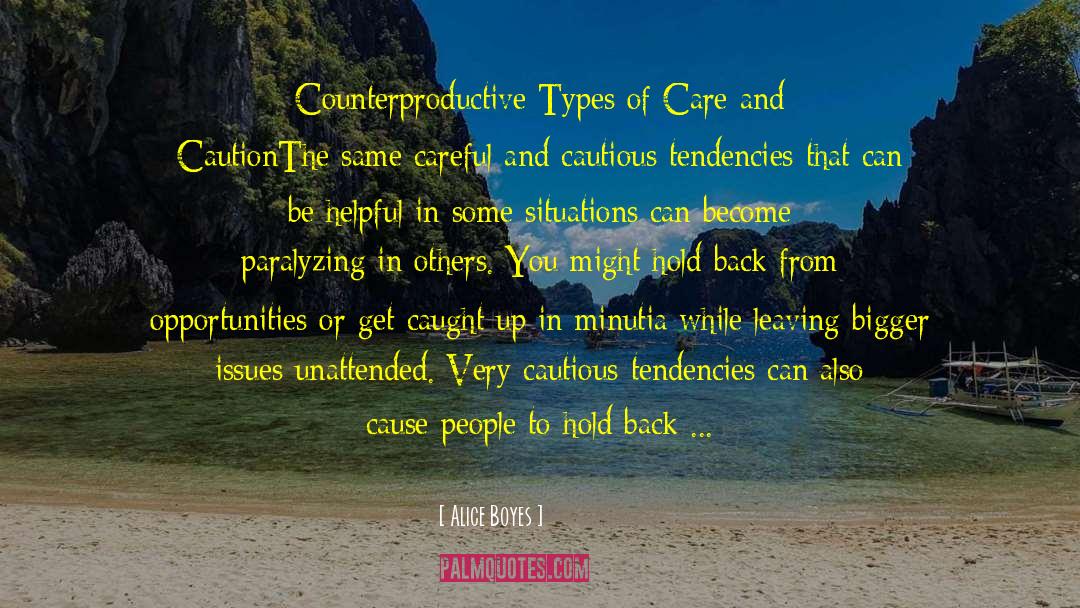Alice Boyes Famous Quotes
Reading Alice Boyes quotes, download and share images of famous quotes by Alice Boyes. Righ click to see or save pictures of Alice Boyes quotes that you can use as your wallpaper for free.
Skills you dislike are often a fertile hunting ground for fixed mindsets that are still hiding and could possibly be challenged. What are some ways you could potentially pursue the disliked skill that would utilize your core strengths and interests? You don't have to commit to doing anything; this is just a thought exercise. For example, someone who is into chemistry but not into cooking could start thinking about the chemistry aspects of cooking.

Accept That You Often Won't Know Why Other People Have Acted in a Particular Way
Humans like to have explanations for why things happen. When we don't have one, we tend to invent something. Sometimes the explanations involve personalizing. Personalizing is when you take something more personally than it was meant in reality. If a work colleague is rude and abrupt, you might think it's because she's annoyed at you, and not consider that it might be because she's feeling flustered by something unrelated. Anxiety-prone people who don't like uncertainty can be especially likely to ruminate about why something has happened and come up with explanations involving excessive personalizing. To overcome this, you need to learn to tolerate that you're not always going to know why people behave the way they do.
Recognize that if someone acts strangely, there's a very high likelihood that the behavior has something to do with what's happening for that person, rather than being about you, and you're probably never going to know what the reason was. You can save yourself hours or days of rumination and upset if you can tolerate the idea of not knowing. While there might be some cases in which you try to find out what the issue was, in many cases your only real choice is to let it go. Try to arrive at this insight before you've done hours of ruminating!
Experiment: Was there a time recently when in retrospect it would've been better to accept not knowing the reason for s
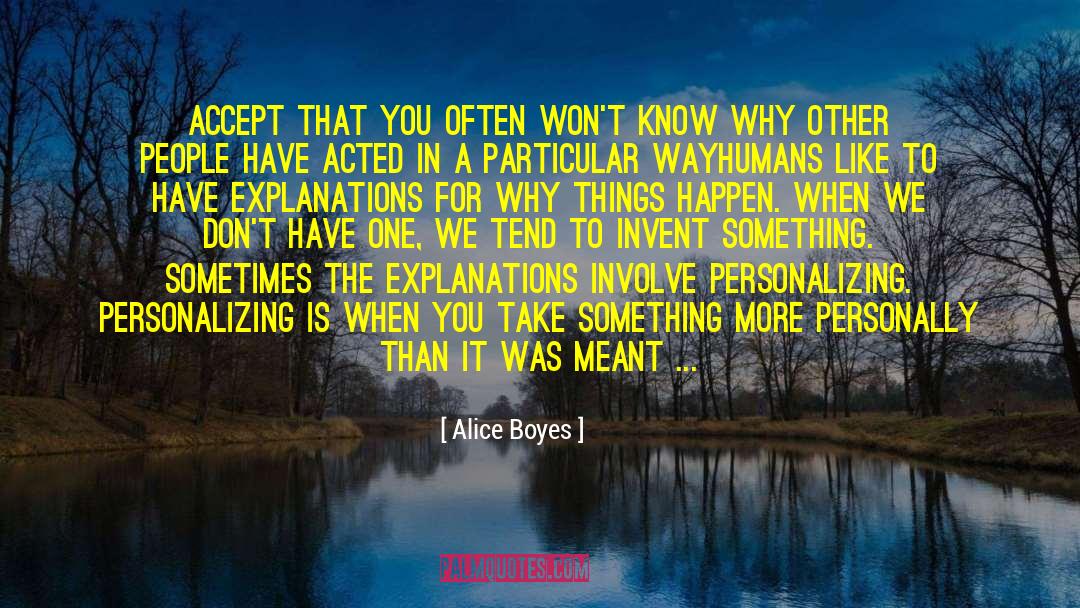
Strong personality traits can sometimes give you a huge competitive advantage over other people - they can help you achieve things others don't. However, the trick is moderating these personality traits so that they don't dominate your nature. For example, being extremely persistent - which anxious, high achievers often are - can have a huge upside. However, if you're very persistent but can't moderate it, it can be difficult to take a break in situations in which you need one. You might find it hard to step away when you're stuck on a task and not getting anywhere or when you're involved in an argument that's going nowhere and only getting more heated. The more extreme a trait is, the more likely it is to be a double-edged sword - sometimes useful and sometimes not.
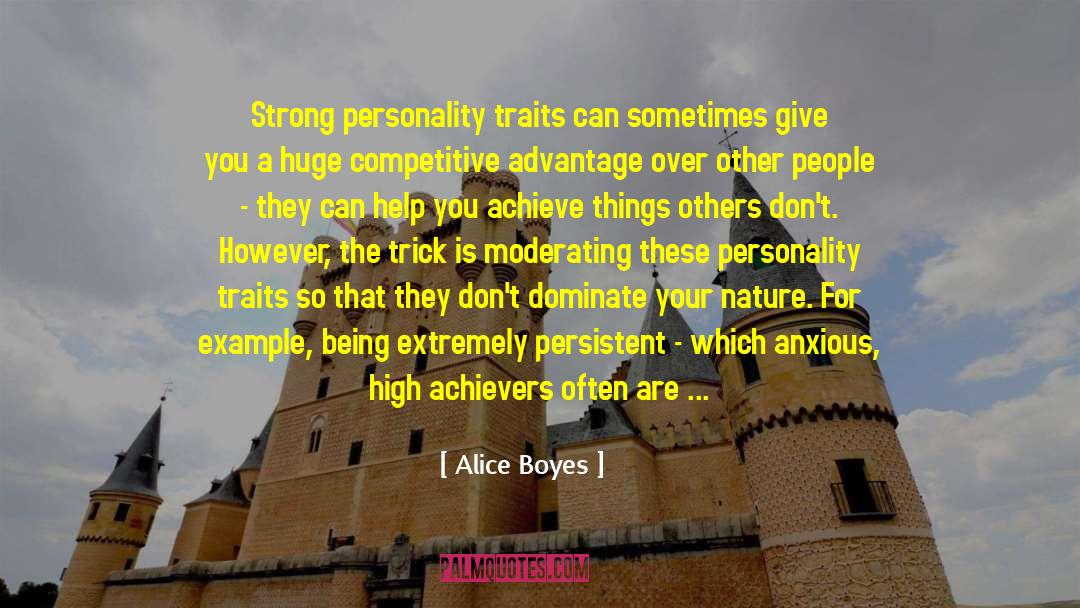
The more time and energy people spend managing their anxiety, the more it sucks the oxygen out of the rest of their life.
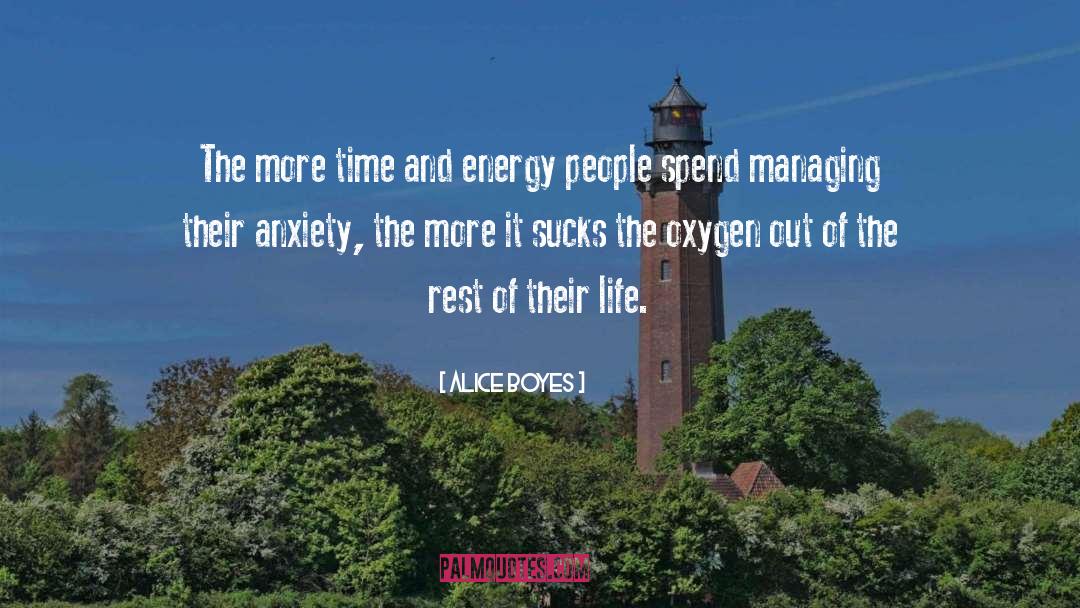
Define Your Options
When people are spinning their rumination wheels about a particular problem, they often don't concretely define what their options are for moving forward. To shift out of rumination and into problem-solving mode, concretely and realistically define what your best three to six options are. For example, imagine you've recently hired a new employee but that person is not working out. Instead of mentally slapping yourself around about why you made the hire, it would be more useful to define what your options are at this point:
--Giving the employee more time
--Shifting the employee's responsibilities to simpler jobs
--Giving the employee checklists of the steps needed to complete each task
--Having another employee work with the individual
--Firing the employee
Defining your options relieves some of the stress of rumination and helps you shift to effective problem solving. Keeping your list of options short will prevent you from running into choice-overload problems. Research shows that if you consider more than three to six choices, you're less likely to end up making a choice.
Experiment: Practice concretely defining your best three to six options for moving forward with a problem you're currently ruminating or worrying about. Write brief bullet points, like in the example just given. You can use this method for all sorts of problems. For example, a friend just used it to come up with ideas for how t
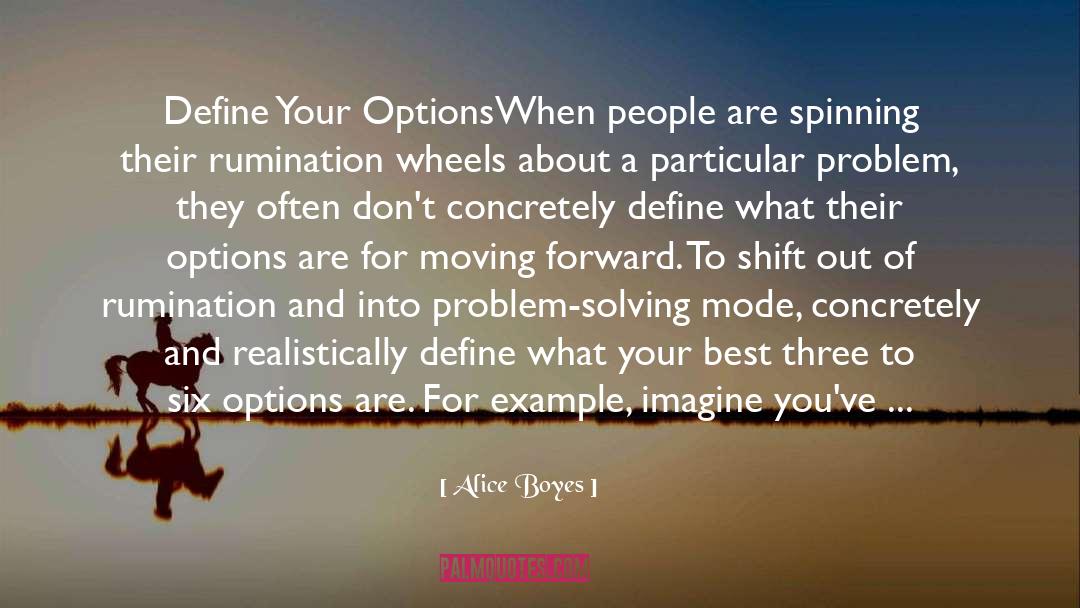
Decrease Anxiety in an Instant
The best way to instantly feel less anxious is to slow your breathing. Try this whenever you feel physically overaroused due to anxiety, or when your thoughts are either racing or frozen. Slowing your breathing will automatically slow down your heart rate. You'll feel calmer. Since this is a physiological fact, it's about the only anxiety strategy that has a 100% guarantee of working. The effect is nearly instant.
Here are some tips for slowing your breathing
1. Before you try to slow your breathing, drop your shoulders. It'll make it easier. Also, focus on breathing slowly rather than breathing deeply.
2. If you have an area of tension in your body, like your neck and shoulders are tight, imagine you're breathing fresh new air into those areas. There's nothing sciencey about this, but lots of people like this method.
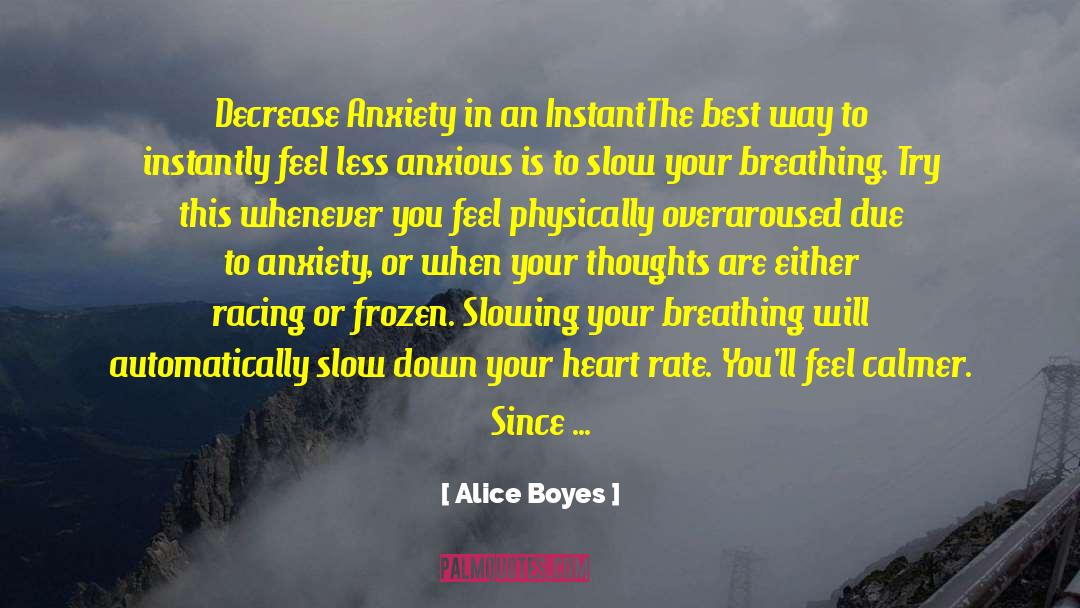
Believe in Your Ability to Cope with Negative Feedback
Just like everyone has a vision blind spot, everyone has cognitive blond spots that can lead to making less than stellar choices. For example, you think an outfit looks good on you, and in reality it doesn't. Or you thought you understood what your boss wanted but later realize you took the instructions in an unintended direction. Since we all have blind spots, making some mistakes and getting some negative feedback is unavoidable. Therefore, unless you plan to go live in a cave, you're going to need a game plan for how you'll cognitively and emotionally cope when negative feedback happens. We'll cover behavioral strategies later in the chapter, but let's work on the thinking and emotional aspects for now.
Experiment: Think about a specific scenario in which you fear negative feedback. If your fears came true:
--How would you go about making the required changes?
--How could you be self-accepting of your sensitivity to criticism? How could you talk to yourself gently about the emotions you're feeling instead of criticizing yourself for feeling upset? How could you be patient with yourself while you're having those feelings?
--What self-care would you do while you wait for your heart and upset feelings to pass? (Yes, rewatching episodes of '90s TV is a totally acceptable answer.)
--What personal support would you access to cope with your emotions? For example, you'd talk to a frie
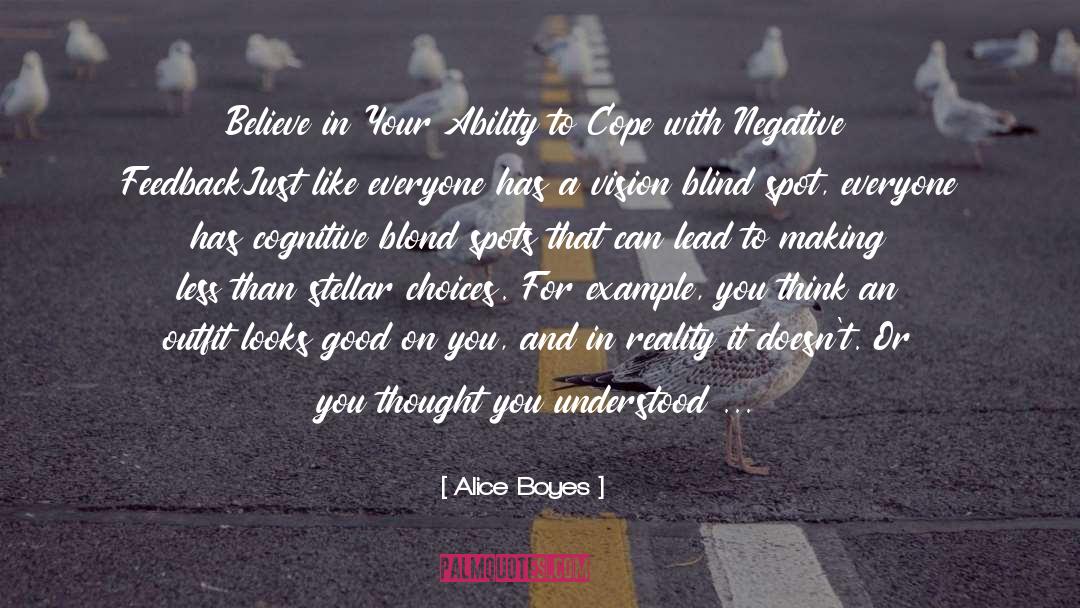
Streamline Your Focus Instead of Jumping From Unfinished Project to Unfinished Project
Although it seems contradictory, anxiety-related perfectionism can cause people to persist too long on some tasks and leave other projects unfinished. Perfectionists who are intolerant of uncertainty often jump from project to project. They might start multiple business plans, grant proposals, job applications, movie scripts, stand-up routines, craft projects, or novels, and not finish any of them. They may sour quickly on an idea when their self-doubt starts to creep in rather than stay with the idea long enough to realistically judge it's potential.
If you bounce from idea to idea, it could very well be because it's hard for you to tolerate your uncertainty about whether the idea you're working on is going to pan out. If you have a habit of not finishing things, you're likely to be better off sticking with a project and finishing it, instead of jumping to another project when you start to feel unsure.
To help you be less tempted to jump around, reduce your exposure to excessive information and alternatives.
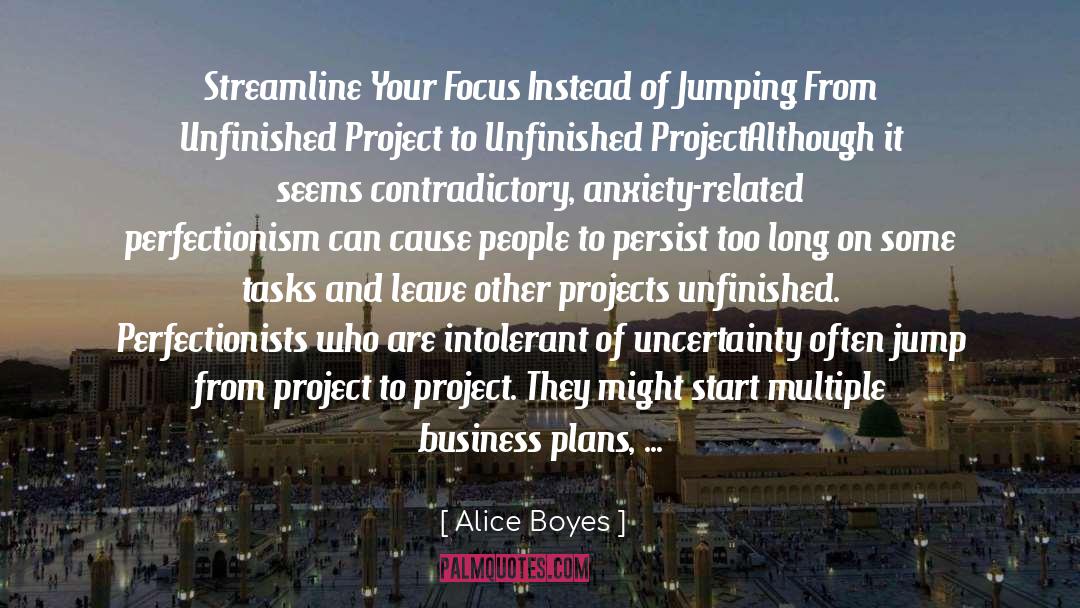
Weekly Check-Ins
Instead of focusing on your anxiety all the time, try scheduling a weekly check-in session with yourself. Clients who have been coming to sessions weekly often just put that same day and time aside. Instead of meeting with me, they meet with themselves. You can do the same.
Pick a time and place that will work for you to do your weekly check-in. Start a notebook (or use the note-taking app on your phone) in which you can record things you might want to address during your weekly check-in. When it comes time for your check-in, use the list as your agenda. If you have lots of issues that come up during the week and end up with a long agenda, just pick the one or two that seem most important to work through.
This process will allow you to take some time to focus on any anxiety-driven issues that occurred during the week that you didn't get a chance to deal with as they happened or where you tried something but it didn't seem to do the trick. Remember to include behavioral traps, like overworking or avoidance coping, if these have occurred during the week.
For each issue, go back to what seems like the most relevant chapter and try a solution from that chapter. For example, if you noticed yourself ruminating about a problem but didn't take problem-solving action (meaning you didn't move from thinking about the problem to taking a behavioral action), you might try defining your problem, generating a list of your best three to six options
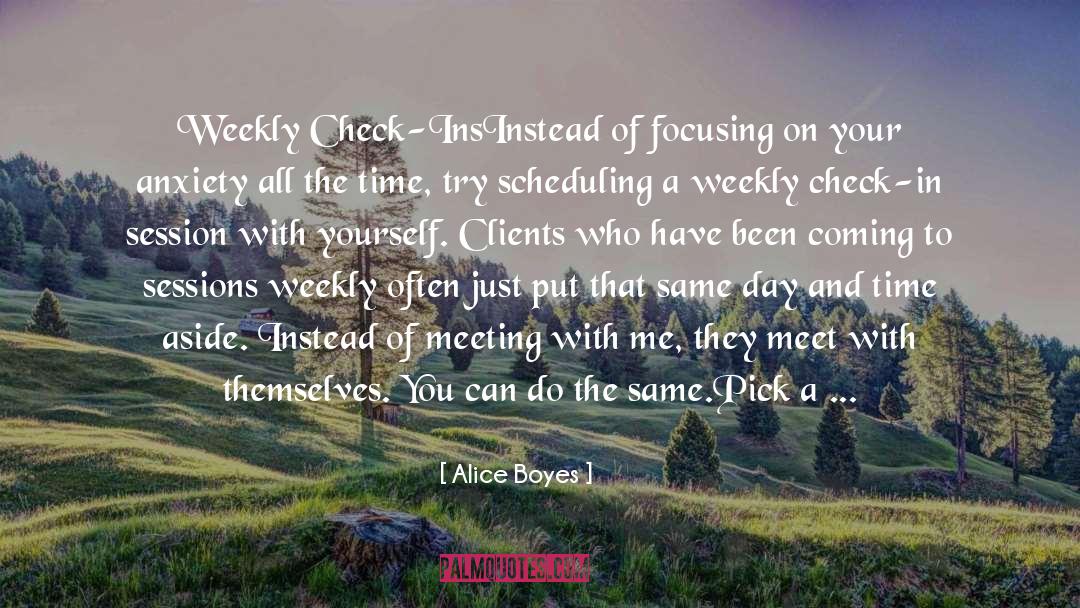
Many anxious people have had a lifetime of people telling them "Don't worry," "Don't stress," "Don't over-think it." As a result of constantly being told to just relax more and chill out, anxious people often end up feeling like there is something fundamentally wrong with their natural self. The "Don't worry, be happy" message ignores research showing that there are benefits to both optimism and what's termed defensive pessimism.
Successfully navigating anxiety involves learning how to accept, like, and work with your nature rather than fighting against it. Personally, I like my nature, even though I'm anxiety-prone. If you don't already, I hope you'll come to understand and like your natural self too. Once anxiety isn't impeding you, this will be easier to accomplish. If you take nothing else away from this book, understand that there's nothing wrong with having a predisposition to anxiety. It's fine to be someone who likes to mull things over and consider things that could go wrong. If you're not spontaneous or happy-go-lucky by nature, there's absolutely nothing wrong with that either. It's fine to consider potential negative outcomes . . . as long as you also:
--Consider potential positive outcomes.
--Recognize that a possible negative outcome isn't necessarily a reason not to do something.
--Recognize your innate capacity to cope with things that don't go according to plan.
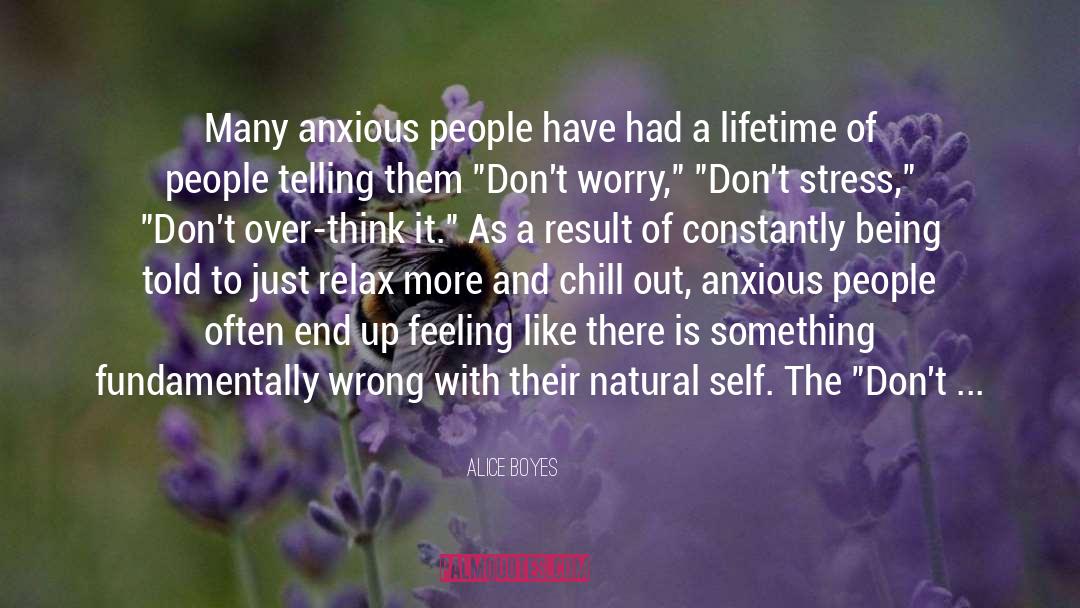
Surround Yourself with Others Who Are Already Doing What You Want to Do
My all-time favorite success tip for people who tend to hesitate excessively is to regularly interact with people who are already successfully doing what you want to do. Why will this help you moderate your tortoise tendencies? Emotions, thoughts, and behaviors all tend to be socially contagious. Therefore, if you surround yourself with people who are already acting in the ways you need to act, this will likely rub off on you. You'll be more likely to take action.
Another key reason for interacting with others who are already succeeding in your field is that many of the key pieces of information that will help you succeed won't be shared in books or other public forums. They're likely passed from person to person. You'll get to know these insider secrets only by befriending successful people.
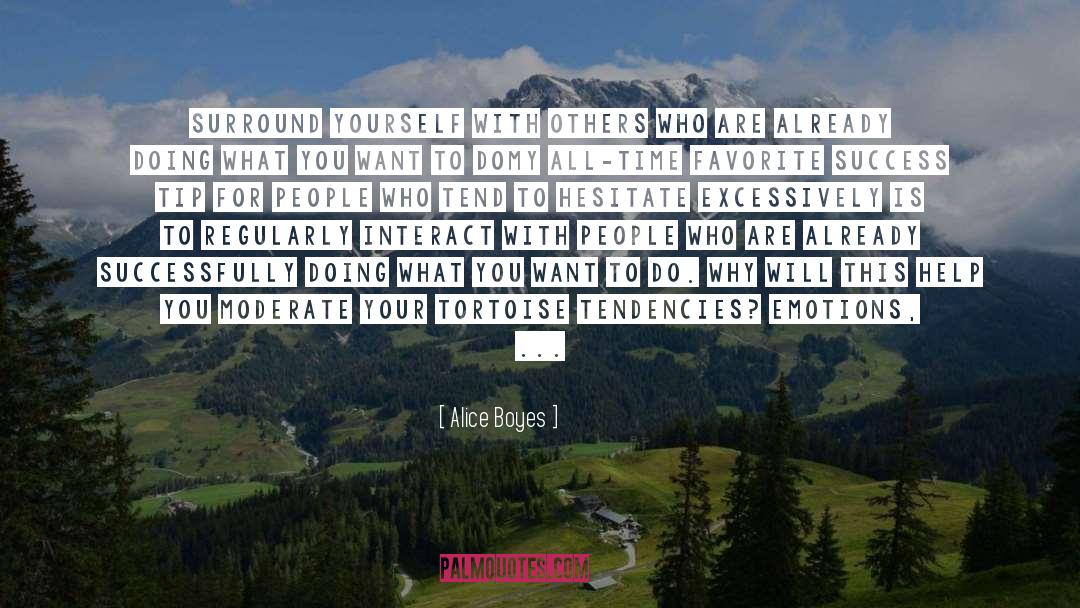
When people's anxiety is less severe, they might not worry that they're going crazy. Instead, they'll often feel like their anxiety is holding them back. If they're not making as much progress with their goals as they'd like, they'll wonder if they're a fundamentally weak or incompetent person. Some people believe their anxiety makes them broken and unlovable. They might question if they're ever going to have satisfying connections with other people or if they're destined for a life of rejection and loneliness.

Pursue Meaning, Not Happiness
Feeling happy is like feeling warm. It's a state of being that feels good. It might sound counterintuitive but focusing directly on pursuing happiness isn't always the best approach to increasing it. This parallels the idea that focusing on reducing anxiety isn't always the best way to decrease it.
What's an alternative to focusing on increasing your happiness? A better idea is focusing on pursuing things that feel meaningful. I'm not necessarily suggesting Mother Teresa-type activities. What gives you a sense of meaning could be anything from cooking for your friends to puttering away on projects in your garage.
Pursuing meaning rather than happiness helps you feel calmer when you're not feeling happy in a particular moment. It smooths out the emotional bumps that come with mistakes, failures, and disappointments. There's research showing that stress tends to be harmful only if you believe that it's harmful and that you can't cope with it. It's easier to believe in your capacity to cope with stress if the stress is part of the bigger picture of building a meaningful life.
Experiment: What makes for a meaningful life from your perspective? Skip over what you think you should answer and identify what's actually true for you.
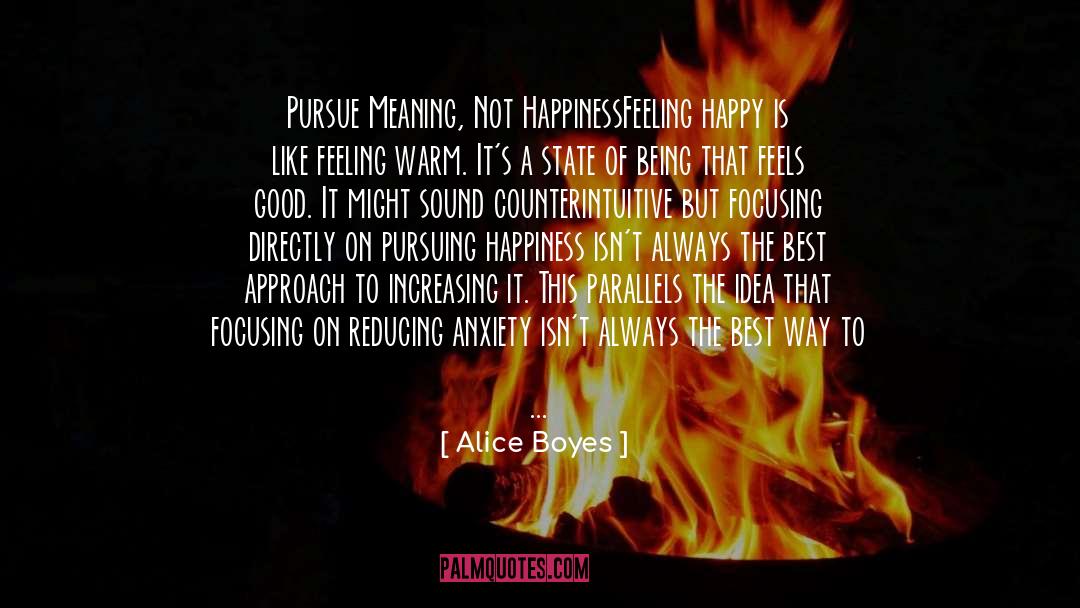
Question the Thought "Failure is Just for Losers"
A failure-related thinking error that anxious perfectionists sometimes make is thinking that failure is just for losers. If you have this thinking bias, try this thought experiment:
Experiment: Think of a highly successful person you admire. It can be anyone, from Oprah to someone you actually know.
What failures has this person experienced in areas where he or she is generally successful? Has a businessperson you admire made some bad investments? Has your favorite actor made a movie that lost money? Has your favorite musician had an album flop?
You may be able to think of examples and failures off the top of your head, or you may need to do some online research or read a biography of that person. Make sure the examples are relevant to the person's core domain of success. A superstar chef opening a restaurant and failing is more relevant than an actor opening a restaurant and failing.
After you've done the thought experiment, ask yourself, "What's an alternative thought that's more realistic and less harsh than 'Failure is just for losers'?"
Alternate option: Ask mentors (people you actually know) about examples of their failures. Ask them what they learned from the experiences. You could also ask your mentors for examples of failures that have happened to prominent people in your field. They might be more willing to volunteer this information than to talk about their own failures.
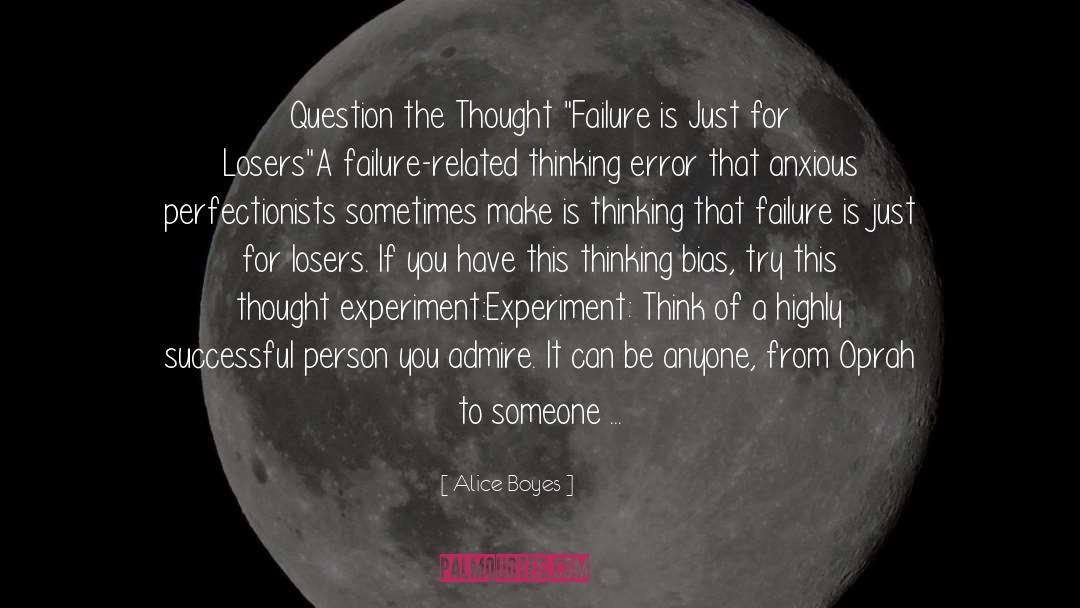
Know Yourself: Are You a Freezer, Flyer, or Fighter?
How avoidance coping manifests for you will depend on what your dominant response type is when you're facing something you'd rather avoid. There are three possible responses: freezing, fleeing, or fighting. We've evolved these reactions because they're useful for encounters with predators. Like other animals, when we encounter a predator, we're wired to freeze to avoid provoking attention, run away, or fight.
Most people are prone to one of the three responses more so than the other two. Therefore, you can think of yourself as having a "type," like a personality type. Identify your type using the descriptions in the paragraphs that follow. Bear in mind that your type is just your most dominant pattern. Sometimes you'll respond in one of the other two ways.
Freezers virtually freeze when they don't want to do something. They don't move forward or backward; they just stop in their tracks. If a coworker or loved one nags a freezer to do something the freezer doesn't want to do, the freezer will tend not to answer. Freezers may be prone to stonewalling in relationships, which is a term used to describe when people flat-out refuse to discuss certain topics that their partner wants to talk about, such as a decision to have another baby or move to a new home.
Flyers are people who are prone to fleeing when they don't want to do something. They might physically leave the house if a relationship argument ge
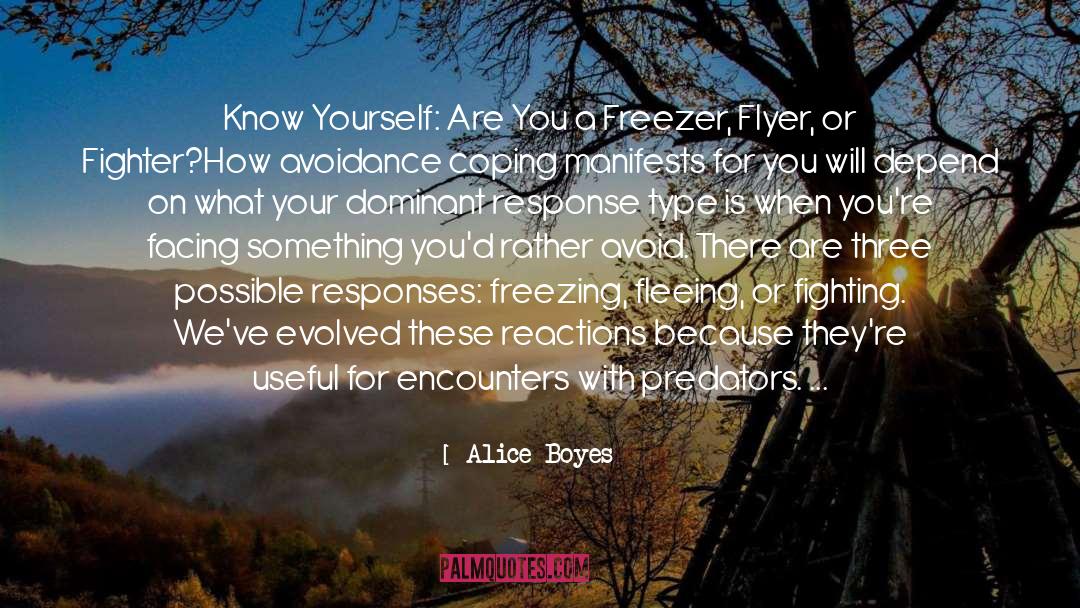
Believe it or not, psychologists have a term to describe people who like to think a lot. The trait is called need for cognition. It refers to people who enjoy effortful thinking and feel motivated to attempt to understand and make sense of things. Because you're reading a book about understanding yourself and your thoughts, chances are you fall into this category.
For the most part, being high in need for cognition is associated with positive traits, like openness, higher self-esteem, and lower social anxiety. On the flipside, some other types of intensive thinking - notably rumination and worry - tend to be associated with being closed to new ideas and poor mental health.
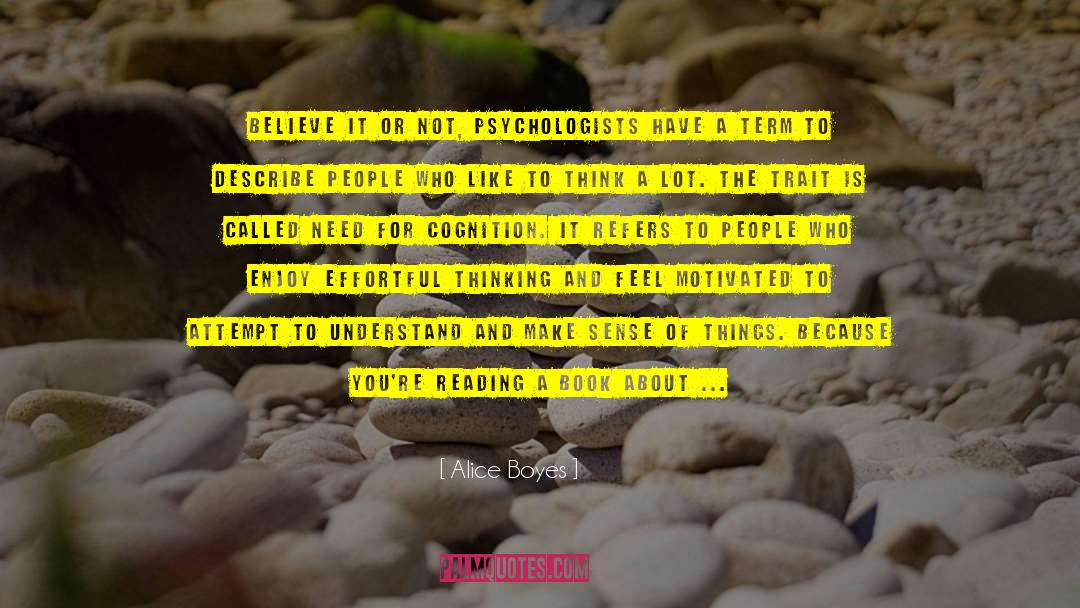
Hand Over Control
If anyone has ever called you a control freak, recognize that your controlling ways and hesitancy about letting other people do things their way is likely to be anxiety related. Your thinking patterns may be related to fears that other people won't do tasks to a standard that's acceptable to you, which may or may not be true in any given instance. Or your controllingness might be related to "should" thinking errors, along the lines of "I should be able to do everything myself," or fears that needing help is a sign of being a weak person.
A behavioral experiment you can try is delegating or outsourcing tasks you feel overwhelmed by.
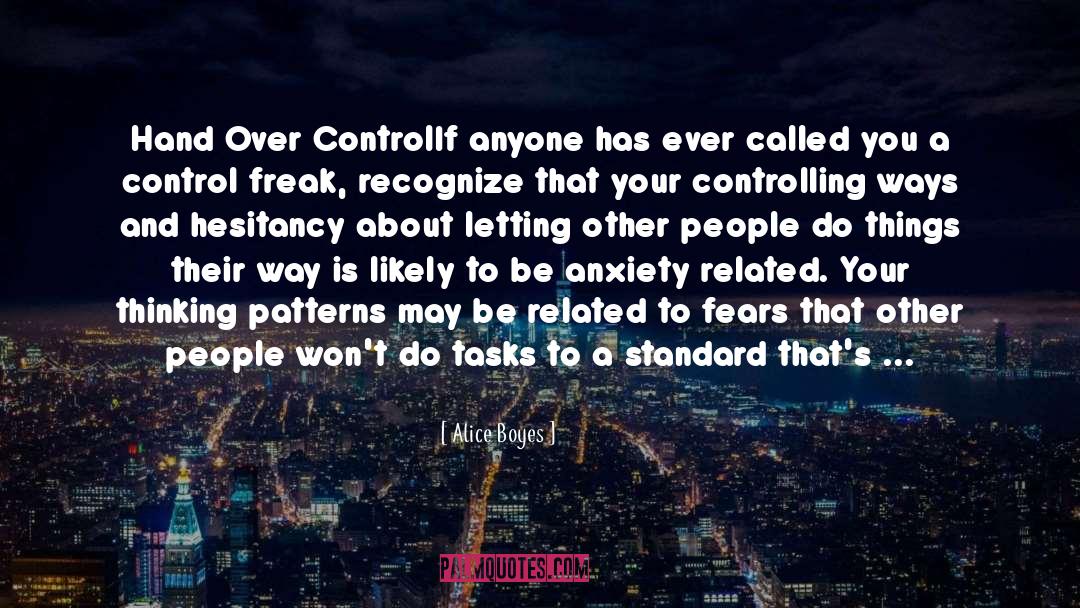
Notice When You Don't React to Situations in an Anxious Way
Even the most anxiety-prone person doesn't always react to situations in an anxious way. Start paying attention to situations in which you:
--Naturally make positive predictions
--Feel confident in your ability to complete challenging tasks
--Receive feedback without personalizing it or catastrophizing
--Ask for what you want without being excessively hesitant
--Feel accepting and relaxed
Start to notice how you are sometimes anxiety-prone and sometimes confident, rather than thinking about anxiety-proneness and confidence as being mutually exclusive traits.

Become Aware of Memory Bias
When people are anxious, they often have biased recall for events. For example, Brian talks himself into believing he screwed up an interview for a promotion because he thinks over and over about things he could've said. However, he doesn't as easily recall the good answers he gave. He endlessly mentally rehashes ambiguous cues the interviewers gave off, such as appearing to rush through questions, but doesn't as easily recall when the interviewers responded positively.
Another example: A friend of mine used to talk herself into believing she'd failed every exam she ever took. She'd ruminate over all the answers she hadn't known and wouldn't recall questions she'd been able to answer correctly. The take-home message when you're ruminating: Don't trust your memory. You might be ruminating about something fictional or at least magnified. This also applies to ruminating about how you think others perceive you; you may just be mind reading based on a biased memory of interactions.
Experiment: Do you have any current rumination topics where memory bias might be playing a role? If you can't think of anything now, come back to this experiment when you have an issue that fits. Answer the following questions:
1. What's your ruminating mind telling you?
2. What are the objective data telling you about whether your ruminative thoughts are likely to be correct? For example, my friend who always convinced herself she'd fail
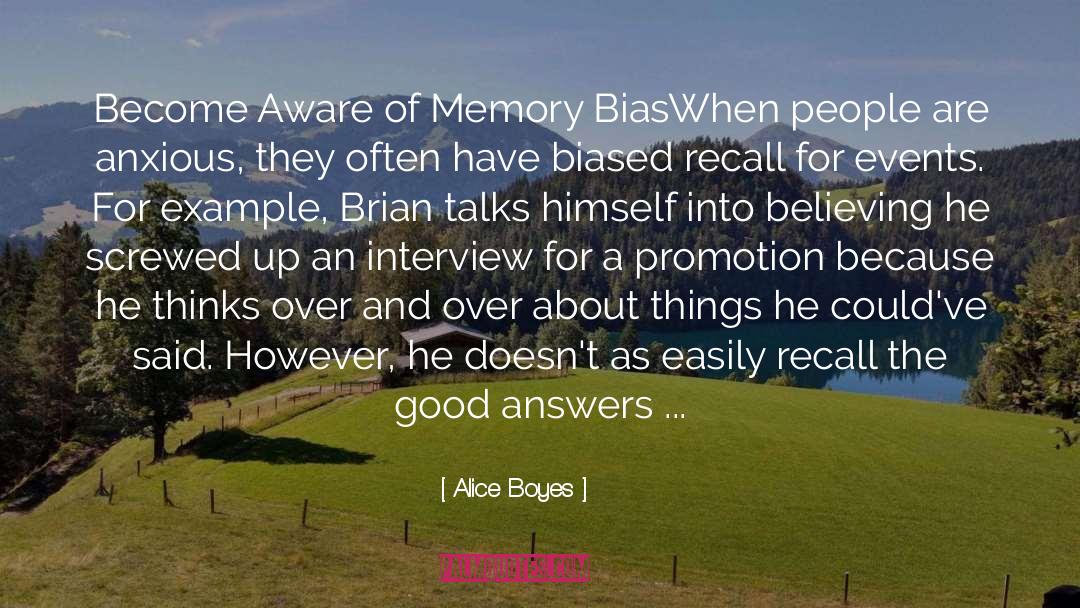
Experiment: To replace negative character labels, try the following steps:
1. Pick a new, positive character label that you would prefer. For example, if your old belief is "I'm incompetent," you would likely pick "I'm competent."
2. Rate how much you currently believe the old negative character label on a scale of 0 (= I don't believe it at all) to 100 (= I believe it completely). Do the same for the new positive belief. For example, you might say you believe "I'm incompetent" at level 95 and believe "I'm competent" at level 10 (the numbers don't need to add up to 100).
3. Create a Positive Data Log and a Historical Data Log. Strengthening your new, positive character label is often a more helpful approach than attempting to hack away at the old, negative one. I'm going to give you two experiments that will help you do this.
Positive Data Log. For two weeks, commit to writing down evidence that supports your new, positive character belief. For example, if you are trying to boost your belief in the thought "I'm competent" and you show up to an appointment on time, you can write that down as evidence.
Don't fall into the cognitive trap of discounting some of the evidence. For example, if you make a mistake and then sort it out, it's evidence of competence, not incompetence, so you could put that in your Positive Data Log.
Historical Data Log. This log looks back at periods of your life and finds evidence from t
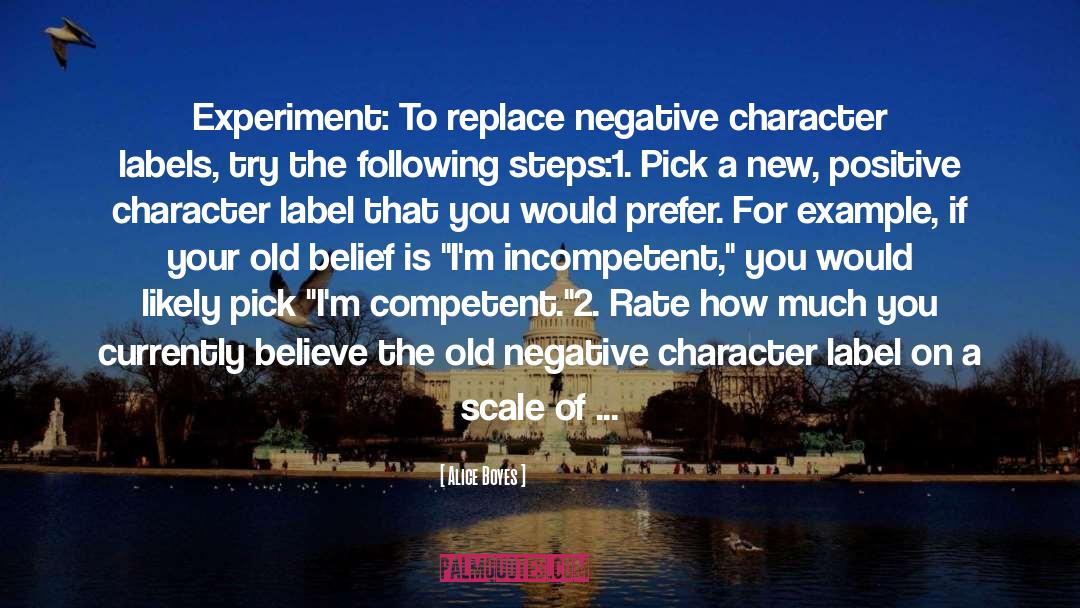
When you're working hard on achieving your goals, the ideal scenario is that you enjoy the successes you experience along the way and take setbacks in stride.
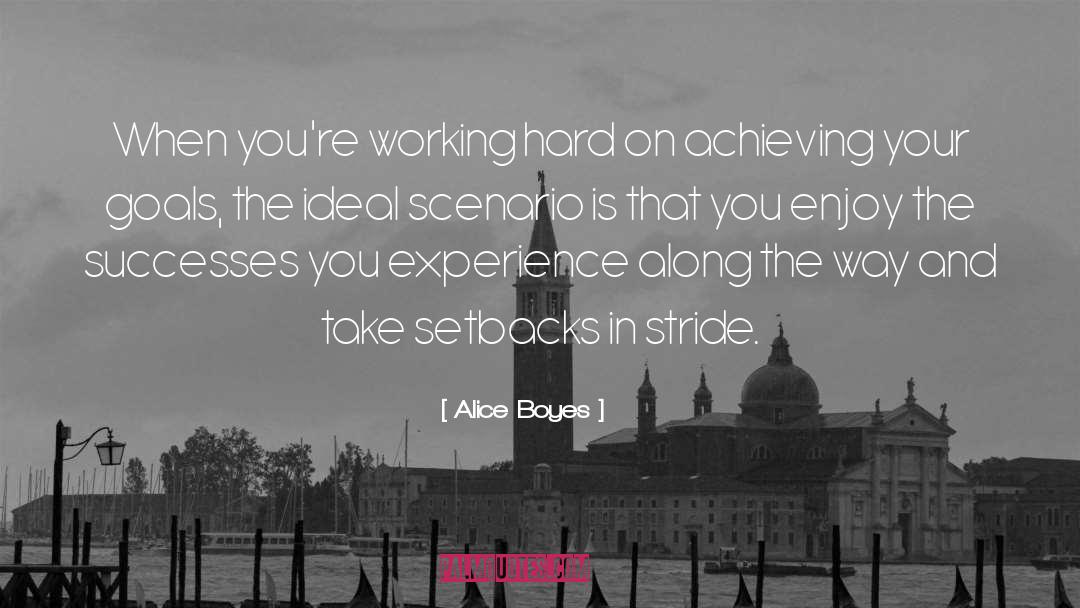
Expose Yourself to Opportunity
Achieving personal dreams doesn't always rise out of relentless pursuit of goals. Sometimes you achieve dreams simply by exposing yourself to life. If you're restricting how much you're living your life due to feelings of anxiety, you'll miss out on unexpected opportunities to achieve your goals.
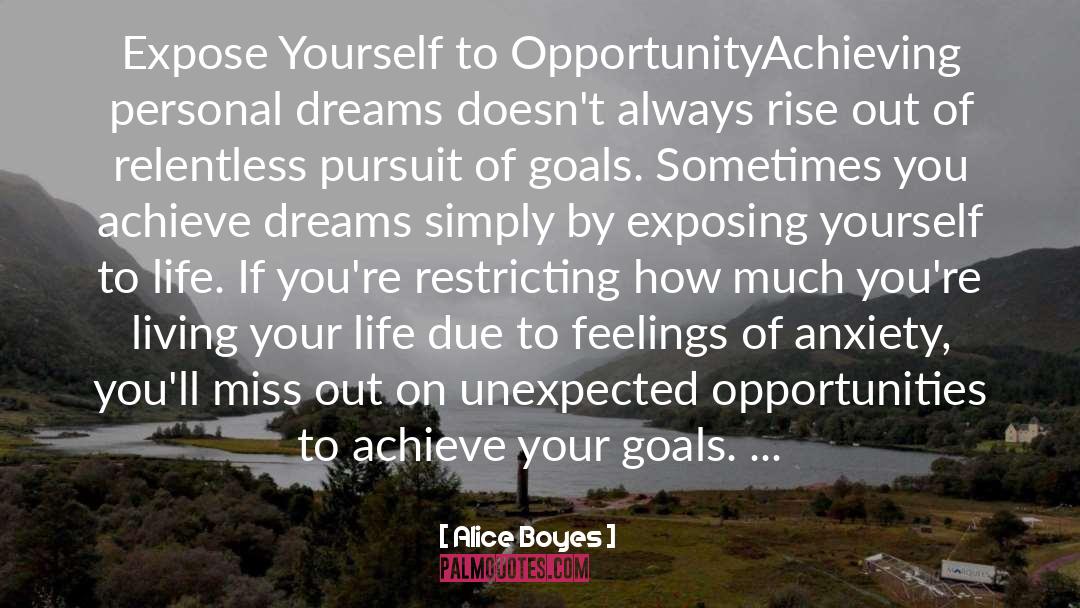
On a positive note, if you can clearly see that you could cope with trying something and it not working out as you'd hoped, that's very empowering for making the decision to try it.
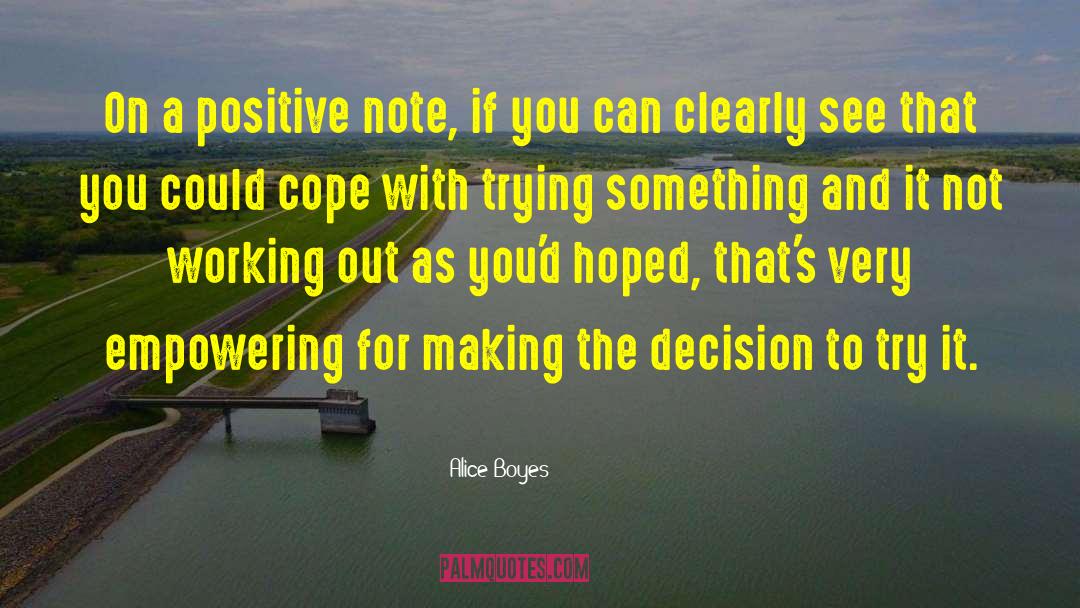
Catch When You're Panicking About Ambiguous Feedback
Anxiety can cause people to sometimes misinterpret feedback once they've received it. When people feel anxious, they tend to interpret ambiguous information (and lack of feedback) as negative. For example, your boss promises to get back to you in a couple of days about a request you've made. You assume this means the answer is going to be no. Another example: You might interpret lack of effusiveness in feedback as evidence the person wasn't impressed with your work. If the person just says "Thanks" when they'd usually say "Thanks, you did a great job," you interpret that as negative.
Experiment: Can you think of an example where you have jumped to a negative conclusion about ambiguous feedback or where you might be likely to do so?
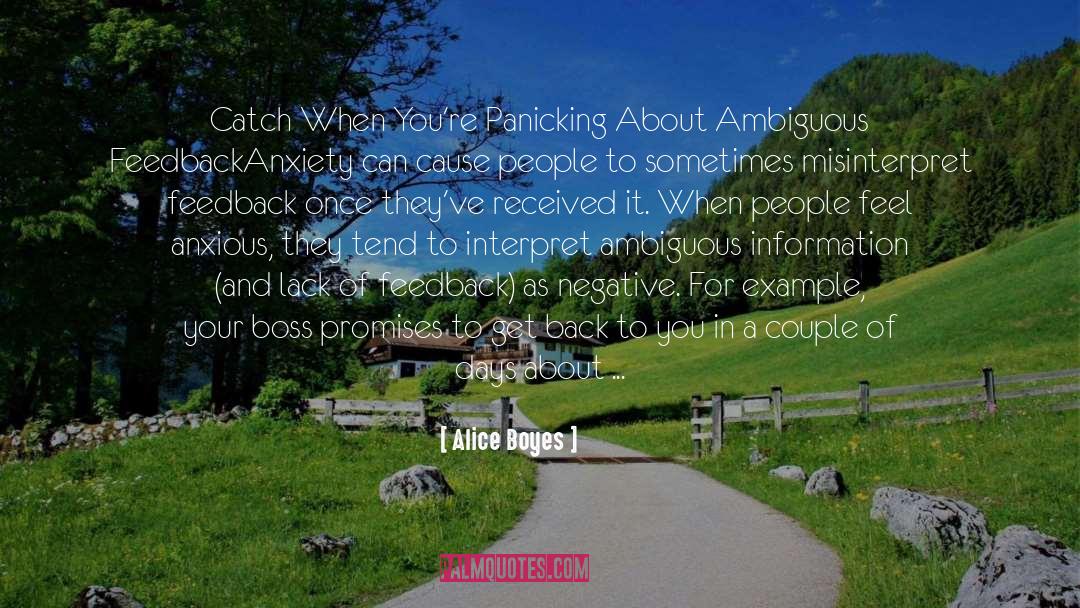
Why am I making the point that even the most anxiety-prone people aren't anxious all the time? Noticing the grayness and fuzziness involved in defining yourself in any one particular way will help your ongoing development of flexible thinking. The purpose of seeing the grayness of your nature is to not label yourself too rigidly.
Experiment: What's a recent example of a situation that someone might've found anxiety provoking, but you didn't?
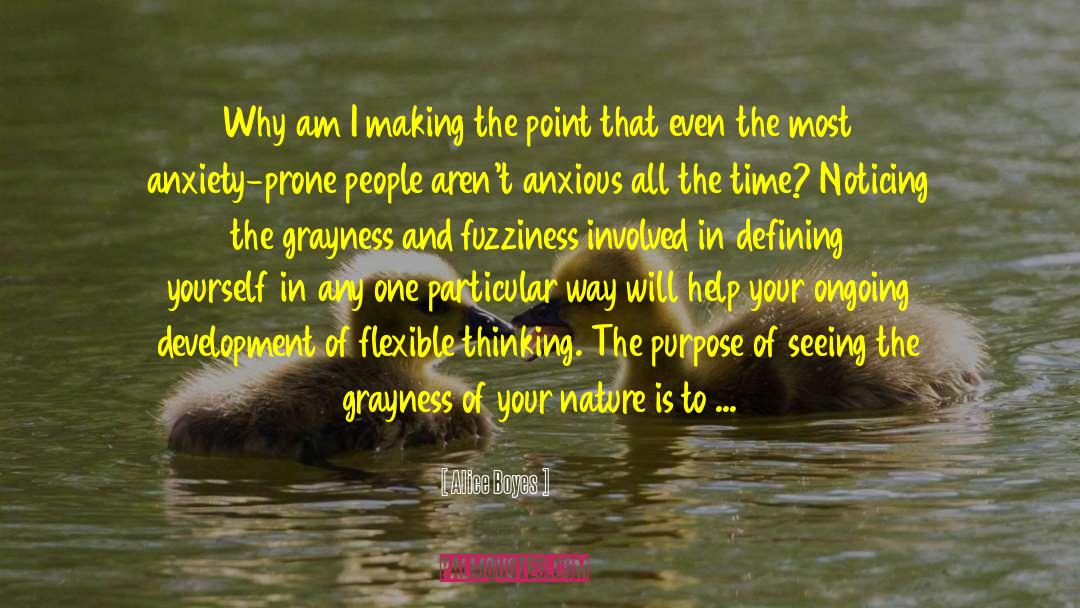
Once you have a short list of your top five strengths, try referring to this list when you have a problem you need to overcome. For example, if your strength is resourcefulness, then remember this strength when you need to solve a problem. To increase your psychological flexibility, try applying your strengths in new ways compared to how you'd usually apply them. For example, if you'd usually apply your resourcefulness to figuring out how to do a task yourself, try using your resourcefulness to find someone you could outsource that work to. If you'd usually apply your strength of conscientiousness to doing a task extremely thoroughly, try applying your conscientiousness to limiting the amount of time and energy you invest in the task and sticking to that limit.
Experiment: List your top five strengths as a person. Since you're free to revise your list at any points (it's yours after all), don't get too perfectionist about it. Once you have your list, identify a task you currently need to do. How could you apply one of your top five strengths to approach that task in a new way?
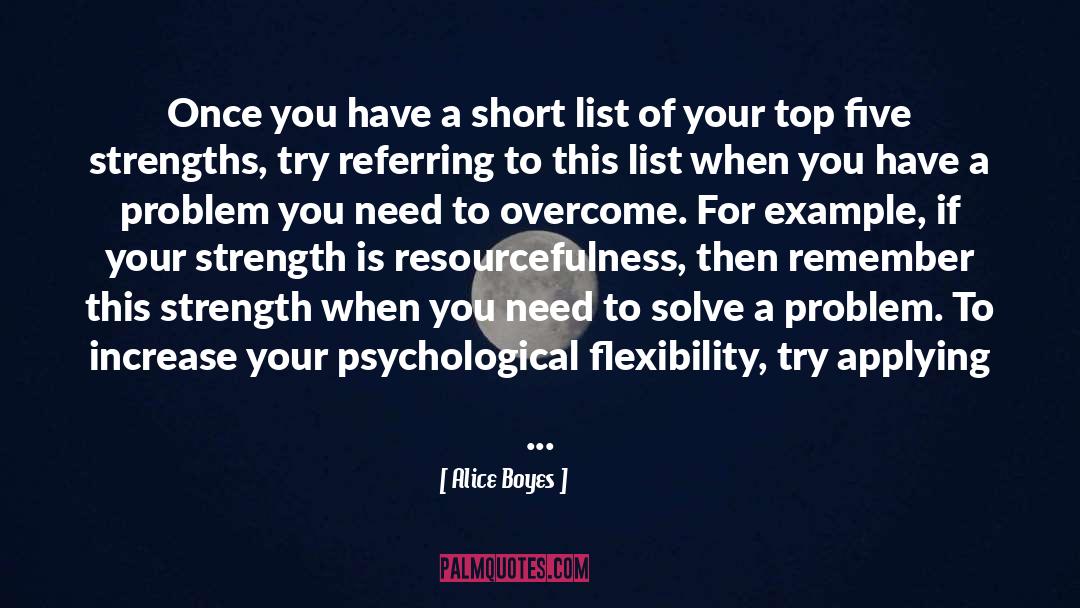
Take Action If You're Ruminating Because of Avoidance Coping
If you're ruminating because you've been putting off dealing with an issue, taking any level of action to address what you've been avoiding will usually help alleviate your rumination. Most of the time, you won't need to completely resolve the issue to lift your rumination - for example, you might just send an email or make a phone call to get the ball rolling.

Fine-Tune Your Mind to the Benefits of Feedback
When you're in anxiety mode, it's easy to think of feedback as something wholly torturous and psychologically painful. Can you nudge this thinking by attuning to some of the benefits?
--You may find out you've done something well.
--You may discover that things you perceive as minor aspects of your work are seen by other people as major strengths.
--You may achieve more success because what you produce after feedback is better. For example, someone gives you a tip or suggests a change that improves your work. You realize you like the new version, but it wasn't something you would've attempted without a push in that direction.
--Through feedback, you may get new insights that help you solve problems you've been stuck with. The feedback giver may offer useful information about how he or she previously solved the problem you're currently having.
--Lastly, the process of receiving feedback can strengthen your relationship with the person giving the feedback. It can be a bonding experience.
Experiment: Try one (or both) of these options:
Option 1: Think of one specific instance in the past when negative feedback has actually been useful to you.
Option 2: Go through each of the listed benefits of feedback, and write one example of a specific situation in which you received that benefit.
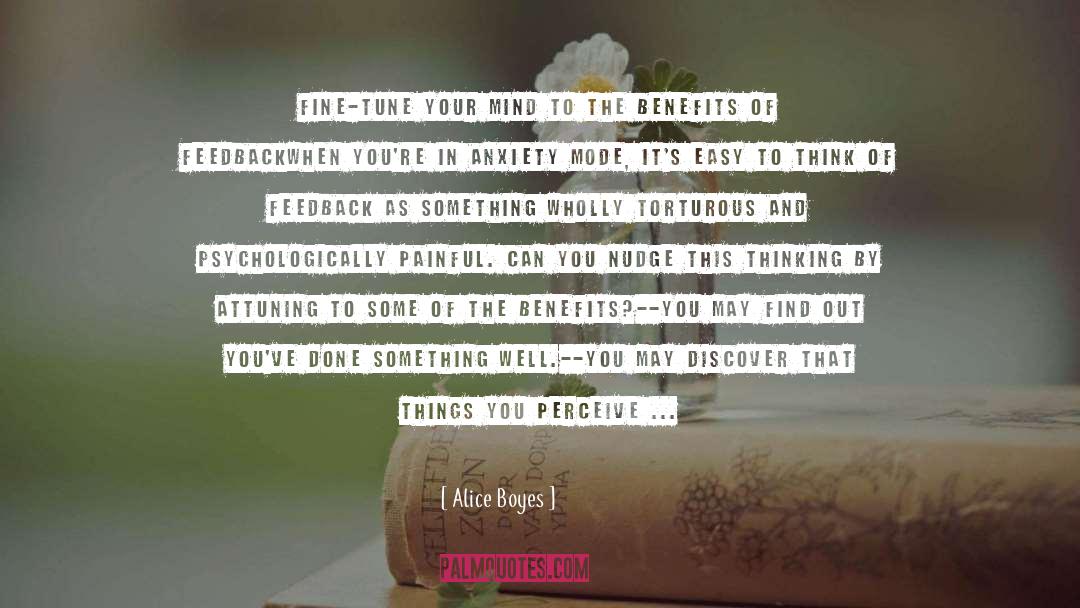
Next Action
When you're avoiding something, try identifying the next action you need to take to move forward. Do that action. For example, if you have a legal situation and you feel overwhelmed about it, the next action you need to take might be something like emailing a lawyer friend and asking for a referral. If your garden has become overgrown with weeds, the next action you need to take might be locating your gardening tools. If your smartphone is acting up, the next action you need to take might be to run a backup. If you need to buy a new laptop, your next action might be to decide on your budget. Keep in mind that the next action you pick shouldn't be too big. Generally, try to think of something you can do in 15 minutes or less. If you still feel overwhelmed, try picking an even smaller next action. To give credit where credit is due, the concept of defining your next action was first popularized in a productivity book called Getting Things Done. It's a concept many of my clients have found useful.
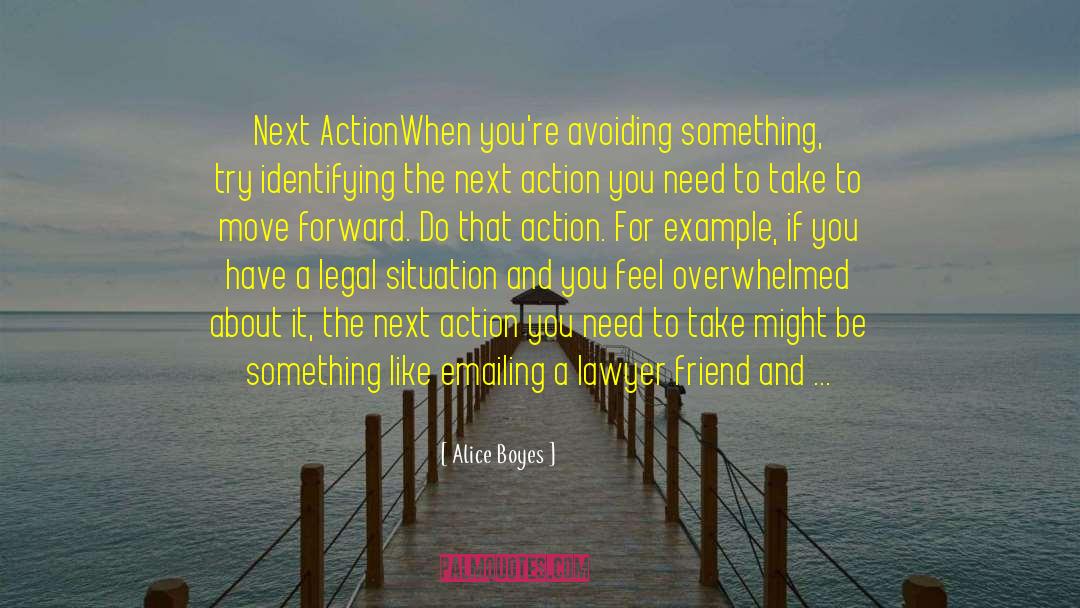
To help ease any anxiety you may be feeling about the pace of your success, practice accepting that productivity and results can take time to come, and often come in cycles.
Experiment: Ask yourself the following questions:
1. Are there any areas of your life where you'd benefit from accepting the pace at which results and progress are occurring?
2. Is there objective evidence that suggests you are on the right track, and seeing positive results is merely a matter of patience and continuing to work methodically?
3. How would you talk to yourself differently if you had more acceptance of this? What would you say to yourself? Remember back to the self-compassion material from the last chapter.
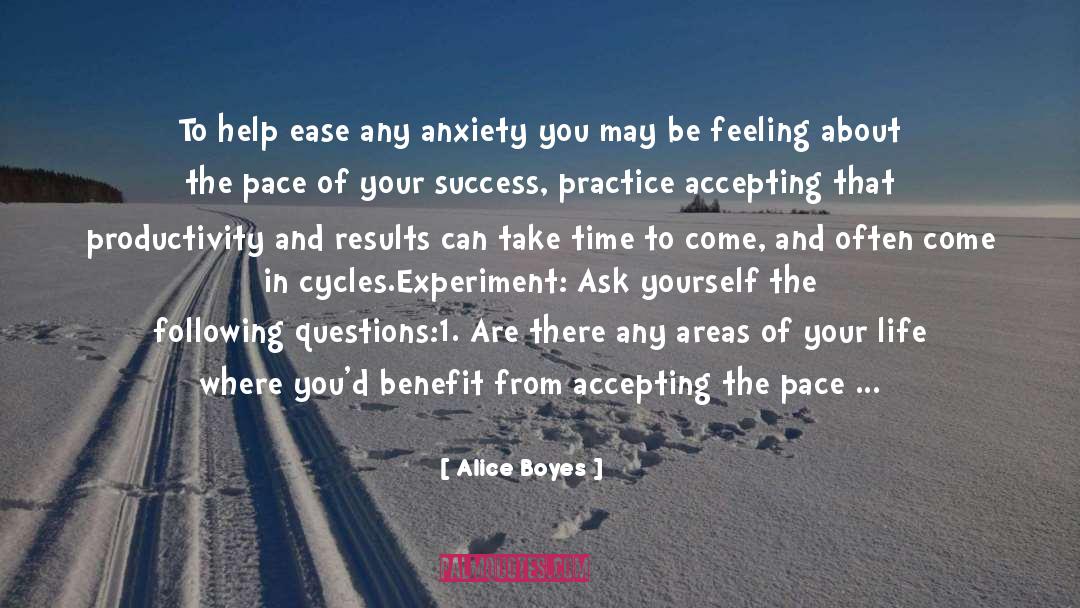
Experiment: Have you ever had the experience of achieving a goal or dream by putting yourself in the right place at the right time? Have you noticed that you expose yourself to less of these opportunities when you're focused on your anxiety?

Recognize the Harm of Not Acting
People who are intolerant of uncertainty tend to work very hard to avoid harm. In other words, they'll jump through more hoops to avoid losing a dollar than to gain a dollar. You can work with your natural motivation if you begin to more carefully consider the harm of not acting. Naturally you may think of all the potential losses, costs, and risks of acting, but what about the costs, risks, and potential losses of not acting?
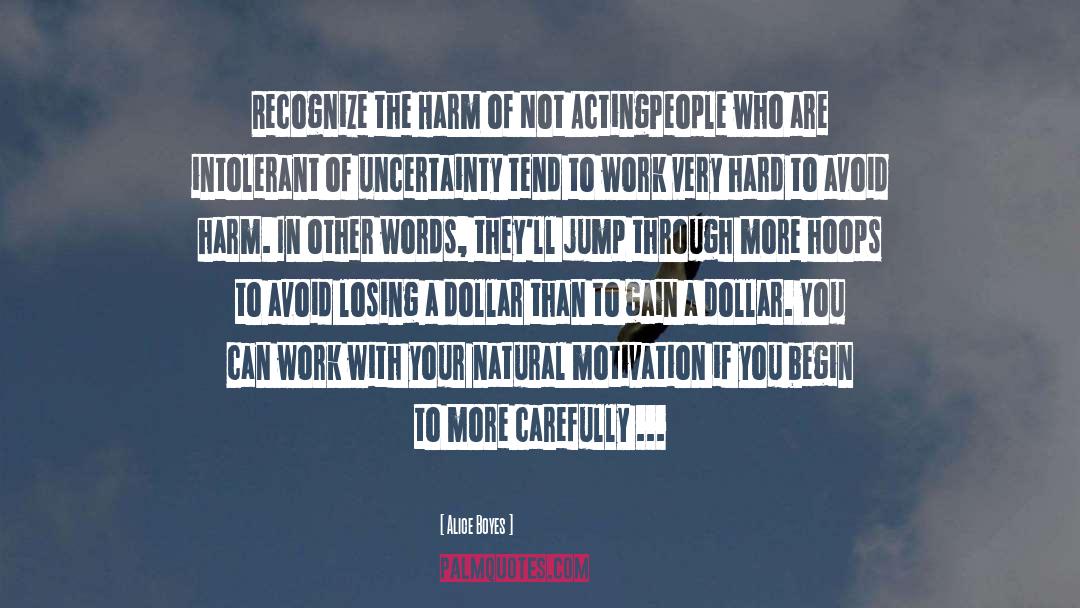
Know Your Warning Signs That You've Persisted Too Long
Because anxiety causes thinking to get narrow and rigid, it can sometimes cause you to persist too long on certain tasks. Since anxious perfectionists tend to be particular and don't like unfinished tasks hanging over their heads, they can be especially vulnerable to this trap. Know the signs that you need to stop persisting. For example, if you work online, one of your personal signs of overpersistence might be that you've searched a forum for over 30 minutes looking for a solution to a problem and haven't found it. This would be a cue that taking a break from trying to solve your problem is likely to be more effective than banging away at it. Another example might be if you've been trying to convince your partner of something for over 10 minutes. You've explained your point of view several different ways, and you're still at loggerheads.
Define your overpersistence warning signs in objective and specific ways. This will make it harder to ignore them than if your definitions were fuzzy.
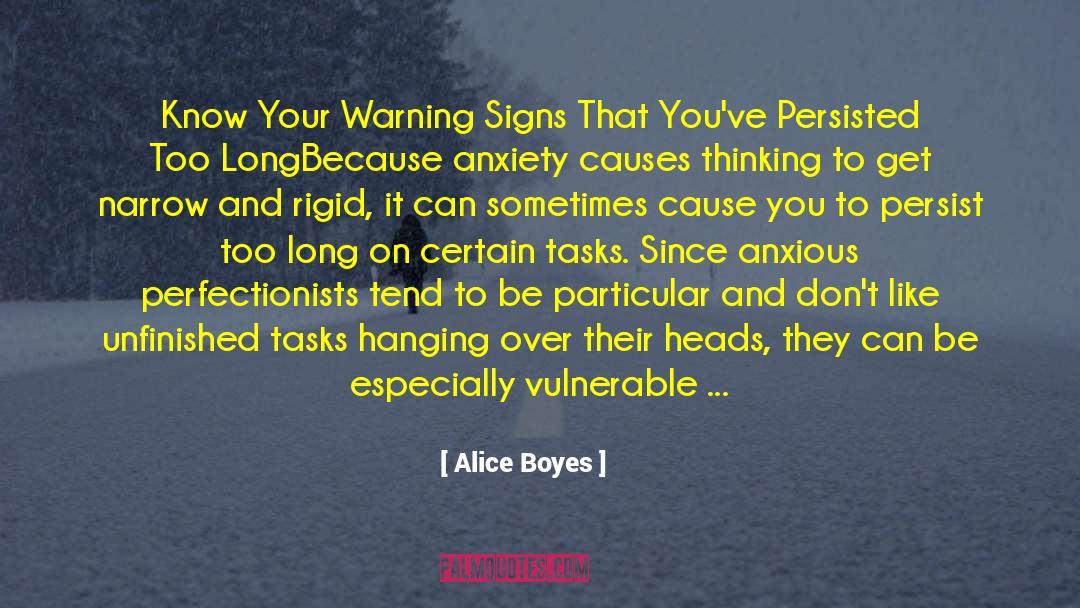
If you've got severe anxiety, it may have created a goals vacuum in your life. It may seem like your anxiety problems have been so all-consuming that you haven't focused much on anything else. This is understandable. Since overcoming anxiety involves moving toward something, not just moving away from anxiety, it'll involve rediscovering what your goals are. You need to uncover the goals that genuinely light your fire, where pursuing them is worth tolerating the anxiety that they create.
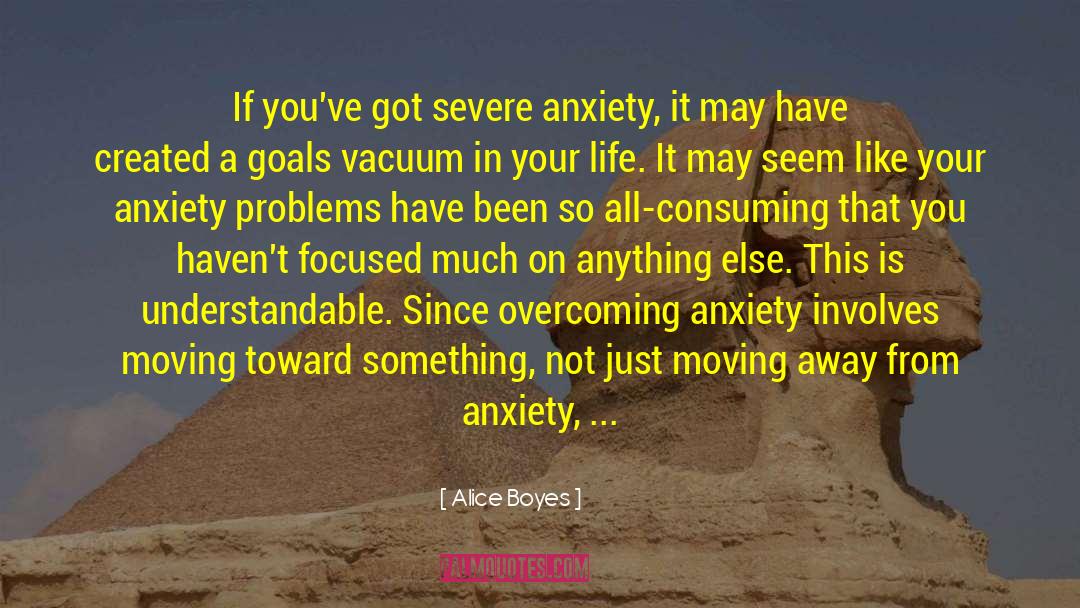
Replace Negative Character Labels
Negative character labels are an even more serious problem than fixed mindsets. Examples of negative character labels include "I'm selfish," "I'm needy," "I'm unlovable," "I'm weak," "I'm defective," "I'm incompetent," and "I'm worthless." Such an uplifting list! Those negative beliefs sound quite dramatic when written down on the page, and sometimes people don't realize that they hold those beliefs about themselves. If your immediate reaction is to say, "Oh, I don't think any of those things about myself" or "Only someone who was super depressed would think those things," then take an extra second to make sure you're not even partially buying into these types of thoughts about yourself. It might be that you believe a negative character label only 20% of the time, but even that can still be an issue.
There are two types of negative character labels. Both can be changed. One type is very stable. For example, you believe you are incompetent, and you have never believed anything else, not even when you are in a positive mood. The other type is the type that goes up and down with your mood, anxiety, and stress. When your mood is low, you believe the negative character label much more strongly than when your mood is positive. If your negative character label changes due to transient things like your mood, anxiety, or stress, this can help you start to see that the belief is a product of these things rather than true.
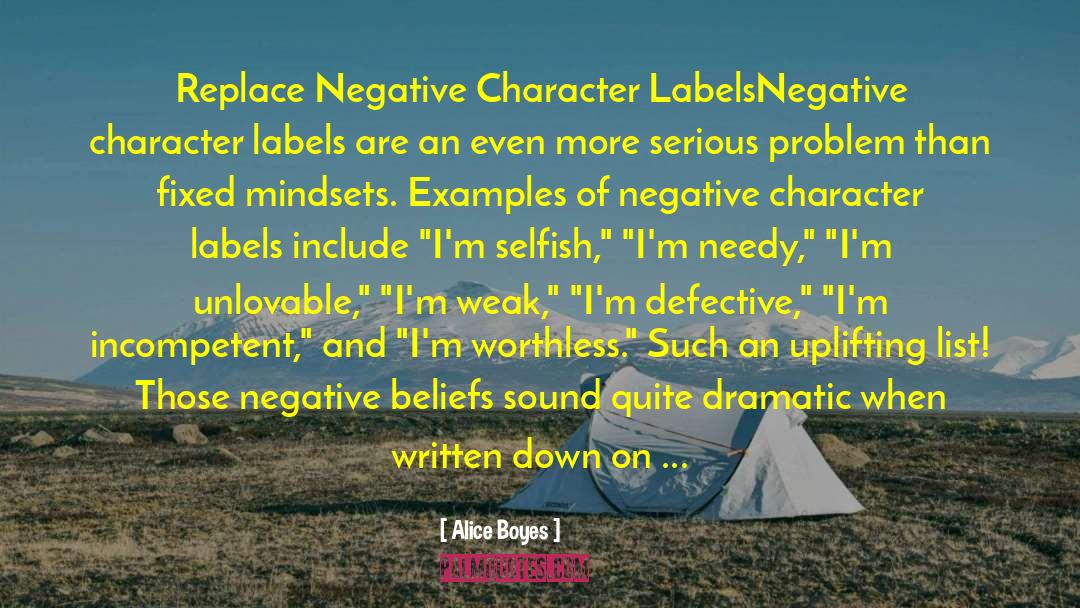
Correct Overestimated Feedback Fears
One of the reasons anxious people fear feedback is that they tend to judge their performance more harshly than others judge them. If you're feeling anxious, you'll probably overestimate the likelihood that any feedback you'll get will be negative - the negative predictions thinking error.
Let's say you need to get feedback on your delivery of an upcoming presentation. You fear that you'll get crucified, that people will say your presentation style is horrible and won't say anything nice. How likely does this feared outcome feel? You might say, "It feels 99% likely." How likely is it in reality? You think, "Objectively, maybe 50%?" Your answer of 50% may still be an overestimate, but at least it jump-starts the shift in your thinking. It alters you that your anxious feelings are, to some extent, clouding your perceptions.
Although it seems strange that people can shift their thinking just based on whether they are asked to think with their anxious mind or their objective mind, this isn't as far-fetched as it sounds. There's lots of research evidence that people's thinking changes based on how they're asked to think about something. For example, my own doctoral research asked people in relationships how their judgments of their romantic partner compared to reality. People recognized that they tended to view their partners more positively than warranted by reality.
Experiment: Think of a current area in your life wh
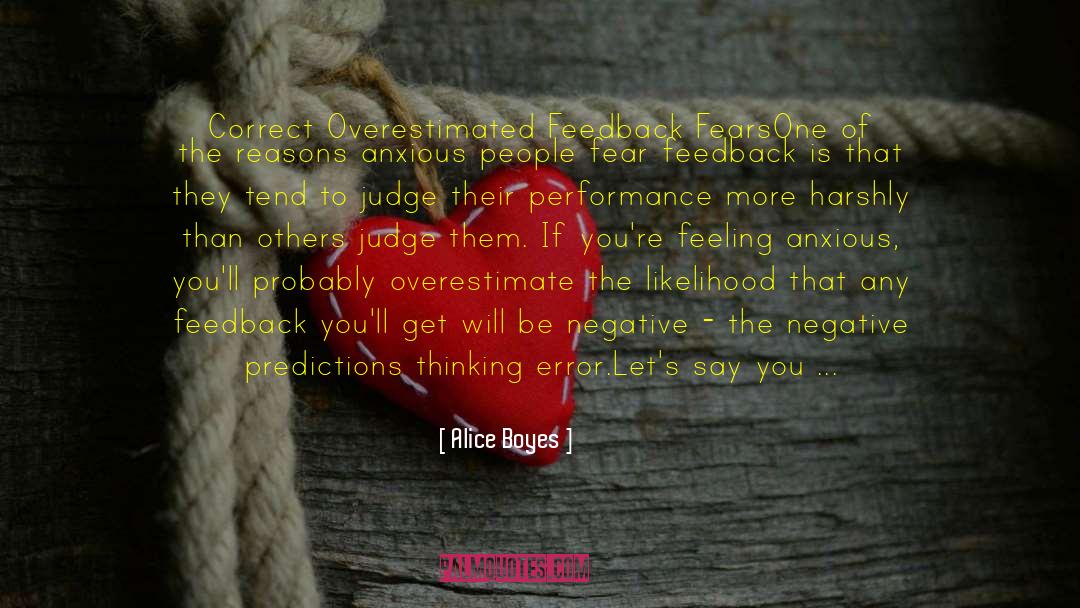
Imagery exposure is a technique in which you vividly recall a situation you've been ruminating about, such as a colleague pointing out an embarrassing error you made. You can also use imagery exposure for a worry thought (something that hasn't happened yet).
To start, recall all the sights and sounds of the past situation (or feared situation) in as much detail as you can. For example, if you're recalling a situation that has happened, you might recall turning bright red with embarrassment and the other people looking at you strangely or laughing. You would also recall details like what the room looked like, what the temperature was, whether the sun was streaming in through the window, and so on. Bring the image of the embarrassing or worry situation vividly to mind.
The following is based on the principle that anxiety symptoms will naturally subside if you don't use escape or avoidance strategies: Deliberately keep the image in mind until your anxiety falls to half of where it started (or less). For example, if vividly recalling the situation triggers 8 out of 10 anxiety initially, hold the image in mind until your anxiety drops to about a level 4. Repeat the imagery exposure exercise at least once a day until you can bring the image to mind without it triggering more than about half of the peak anxiety you experienced the first time you tried imagery exposure.
Exposure techniques like this are some of the most powerful ways to solve problems with intrusive
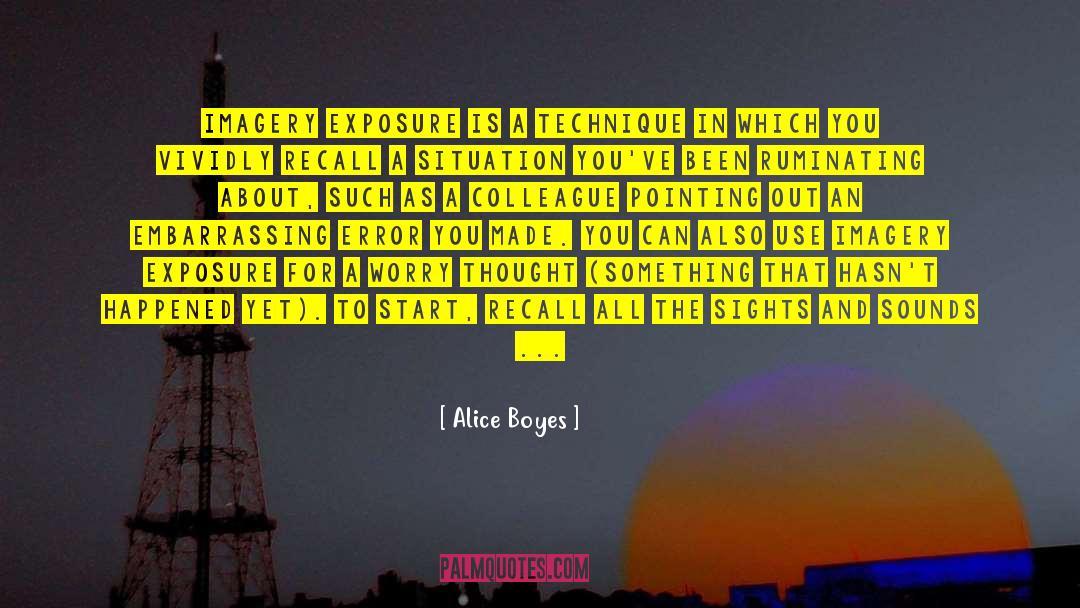
Switch from a Performance Focus to a Mastery Focus
There's a way to keep your standards high but avoid the problems that come from perfectionism. If you can shift your thinking from a performance focus to a mastery focus, you'll become less fearful, more resilient, and more open to good, new ideas. Performance focus is when your highest priority is to show you can do something well now. Mastery focus is when you're mostly concerned with advancing your skills. Someone with a mastery focus will think, "My goal is to master this skill set" rather than "I need to perform well to prove myself."
A mastery focus can help you persist after setbacks. To illustrate this, imagine the following scenario: Adam is trying to master the art of public speaking. Due to his mastery goal, he's likely to take as many opportunities as he can to practice giving speeches. When he has setbacks, he'll be motivated to try to understand these and get back on track. His mastery focus will make him more likely to work steadily toward his goal. Compare this with performance-focused Rob, who is concerned just with proving his competence each time he gives a talk. Rob will probably take fewer risks in his style of presentation and be less willing to step outside his comfort zone. If he has an incident in which a talk doesn't go as well as he'd hoped, he's likely to start avoiding public speaking opportunities.
Mastery goals will help you become less upset about individual instances of fa
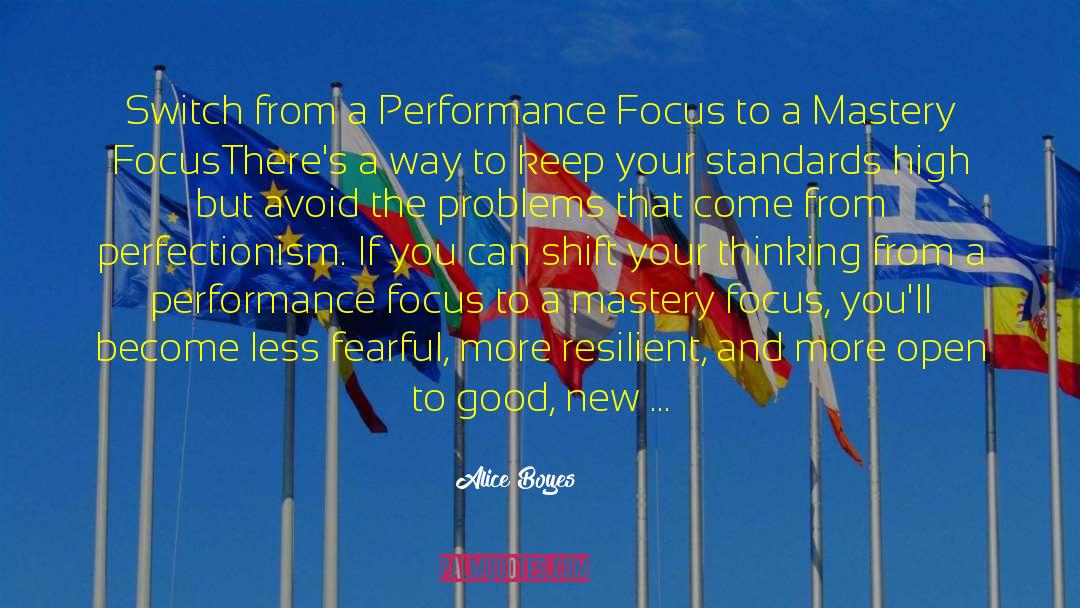
When the routines and circumstances of your life are set up so that your lifestyle is a good fit for your natural preferences, it can give you a feeling of being in equilibrium. This will help prevent you from getting overwhelmed by anxiety on a regular basis. And by arranging your life to suit your temperament, you'll have the time to process and calm down from life events that make you feel anxious. Some areas in which you can set up your life to fit your temperament are:
--Have the right level of busyness in your life. For example, have enough after-work or weekend activities to keep you feeling calmly stimulated but not overstimulated and scattered. Note that being understimulated (for example, having too few enjoyable activities to look forward to) can be as much of a problem as being overstimulated.
--Pick the physical activity level that's right for you. Fine-tuning your physical activity level could be as simple as getting up from your desk and taking a walk periodically to keep yourself feeling calm and alert. Lifting things (such as carrying shopping bags up stairs) can also increase feelings of alertness and energy. Having pleasurable activities to look forward to and enough physical activity will help protect you against depression.
--Have the right level of social contact in your life, and have routines that put this on autopilot. For example, a routine of having drinks after work on a Friday with friends, or attending a weekly class with yo
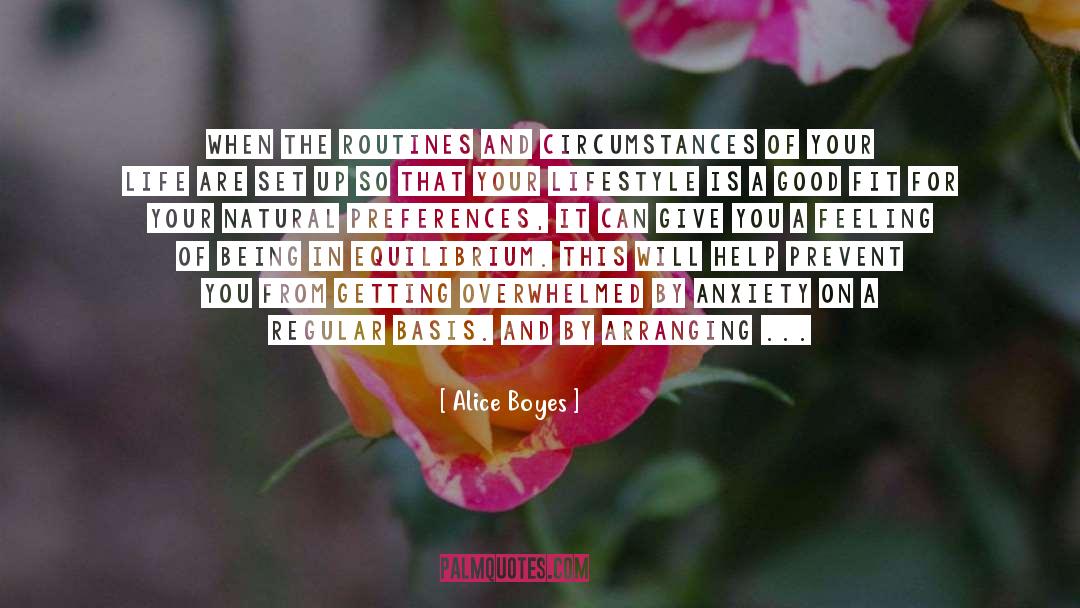
Practice Hesitating Less
Look for small ways to practice hesitating a little less than you usually would. Over time, this will help increase your psychological flexibility: You'll get better at choosing when you want to let a decision marinate vs. when you want to make a decision swiftly, take action, and move on. You'll start to learn from experience that you can move out of thinking mode more quickly without disastrous consequences. For example, if you tend to put off buying things that, in reality, would be a good investment, give yourself some criteria for making quicker decisions. You might commit to making decisions about purchases that are under $50 in less than 48 hours. Choose the level that suits your situation and preferences.
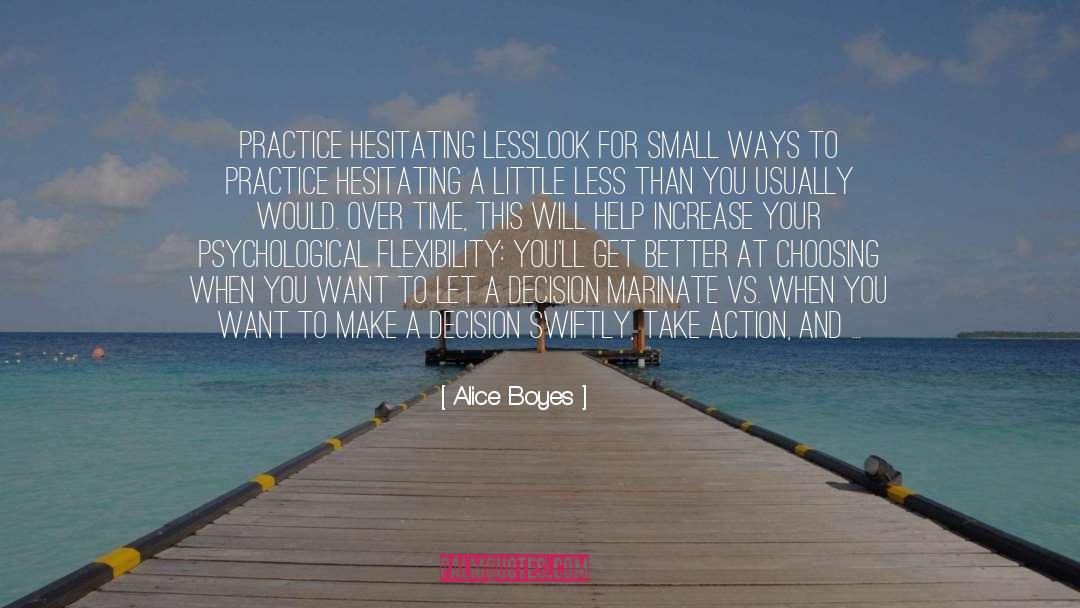
Diversify Your Sources of Self-Esteem
Another way to increase your resiliency is to diversify your sources of self-esteem. Just like putting all your money in a single stock is risky, putting all your self-esteem eggs in one basket is psychologically risky. If your self-esteem is almost entirely based on your career achievements, having a flat stomach, or how hot your boyfriend or girlfriend is, you'll be at more risk of coming unstuck psychologically if your career stalls, you gain weight, or your hot boyfriend or girlfriend dumps you. You'll feel less anxious if your self-esteem isn't too closely tied to just one or two domains.
Experiment: Self-esteem is composed of (1) a sense of self-worth and (2) a sense of being competent at things. For example, sources of self-worth might involve loving and being loved by others; an ability to make other people feel comfortable and at ease, or positive contributions you make to society, your field, or your community. In contrast, a sense of competency might come from being good at computer tasks, being able to prepare a dinner party for 10, or paying your bills on time. Try coming up with three sources of self-worth and three things you're competent at. Aim to recognize areas you've tended to underappreciate.
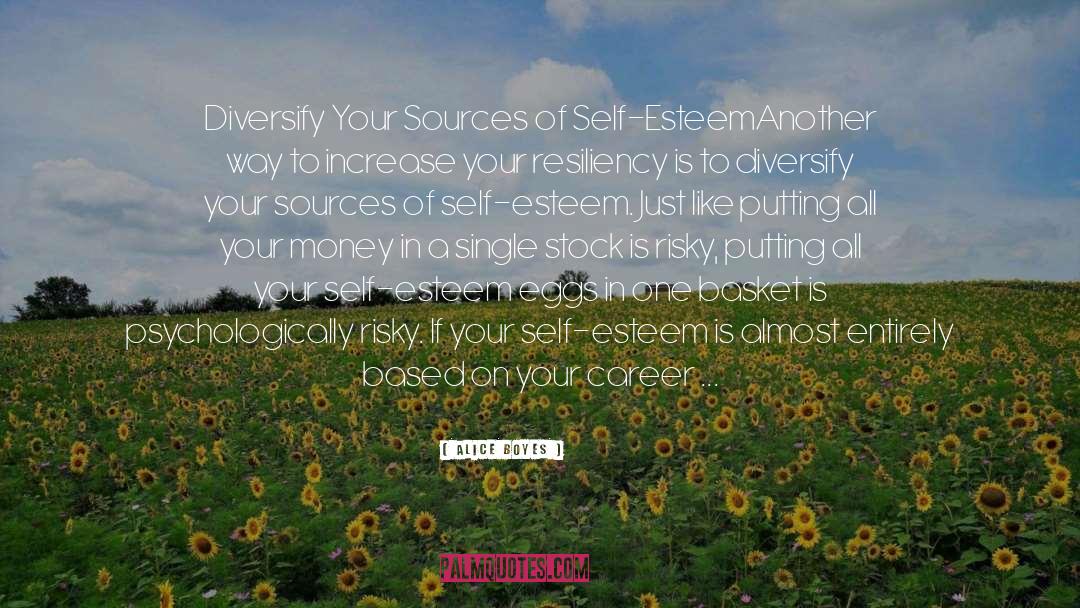
The Agreeable vs. the Disagreeable Anxious Person
Earlier I mentioned people being agreeable or disagreeable. Being generally agreeable or disagreeable has been identified as one of the fundamental dimensions of personality. Just like anyone else, anxious people can be either agreeable or disagreeable. It pays to know which you are. People who are agreeable tend to prioritize getting along with others. They may not be willing to make waves when they can see problems with other people's ideas or plans. In contrast, people who are naturally disagreeable may underestimate the importance of getting along with others and not invest enough in relationship building.
Once you recognize whatever tendencies you have, you can keep them in mind and modify your responses as you see fit. For example, if you're anxious and disagreeable, you may say no more than you should. After all, your nature has you on the lookout for things that could go wrong.
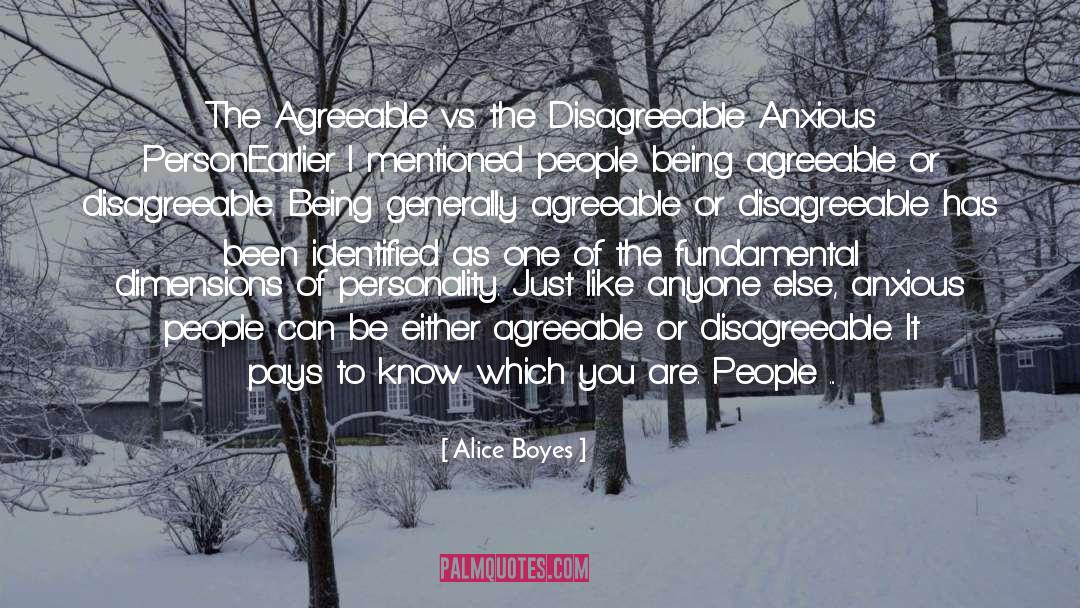
Prevention vs. Promotion Focus
Anxiety is often associated with having a prevention focus. This means being focused on preventing bad things from happening. In contrast, promotion focus means being focused on reaching for new opportunities and rewards. While most people have a dominant focus, it's possible to be high in both types, meaning you're naturally very concerned both with avoiding mistakes and harm and with reaching for opportunities. This can result in a constant sense of pushing forward and pulling back.
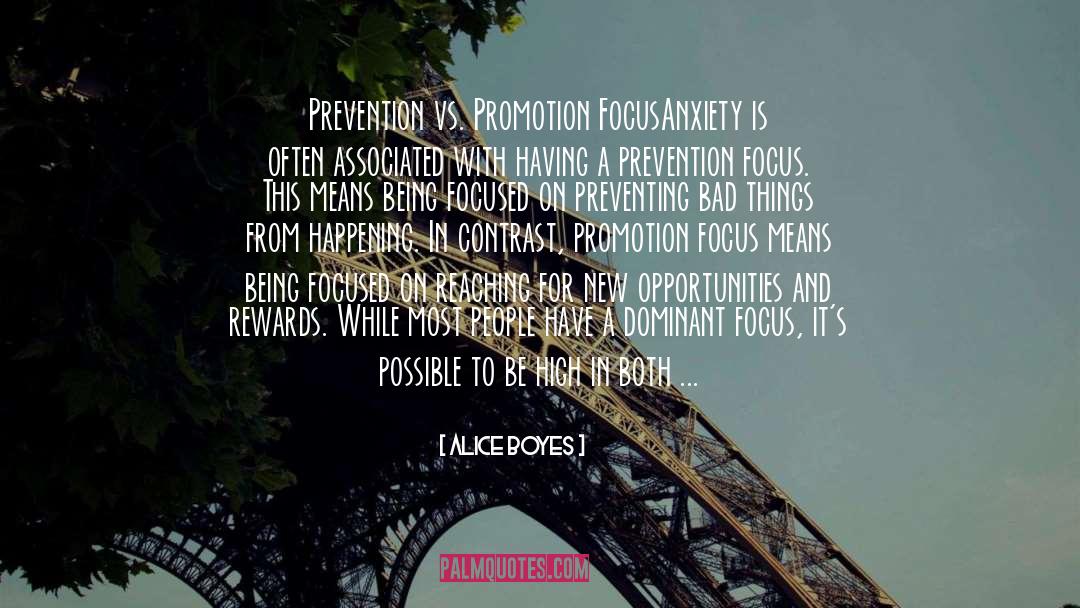
Embrace Your Nature
As we discussed in the last chapter, how sensation seeking you are is biological and wired into your personality. If you have only a few goals, it could be that your preferences for novelty and intense experiences are on the lower end of the spectrum, not that you lack goals. If you're constantly thinking of new goals, there's nothing wrong with that either. It suggests you're hardwired with a high need for novelty and excitement.
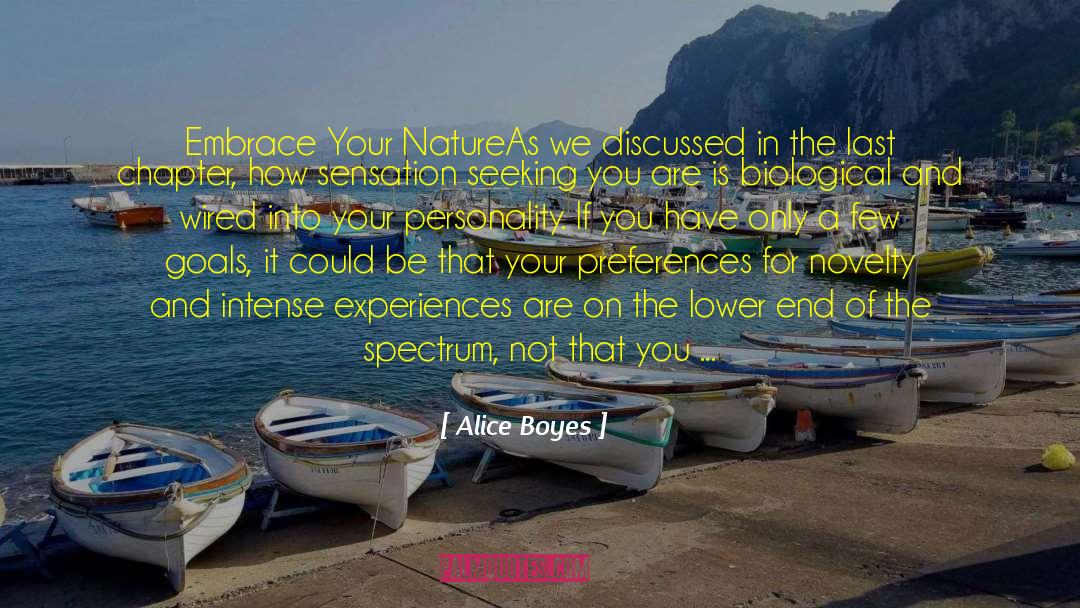
Virtually every version of CBT for anxiety disorders involves working through what's called an exposure hierarchy. The concept is simple. You make a list of all the situations and behaviors you avoid due to anxiety. You then assign a number to each item on your list based on how anxiety provoking you expect doing the avoided behavior would be. Use numbers from 0 (= not anxiety provoking at all) to 100 (= you would fear having an instant panic attack). For example, attempting to talk to a famous person in your field at a conference might be an 80 on the 0-100 scale.
Sort your list in order, from least to most anxiety provoking. Aim to construct a list that has several avoided actions in each 10-point range. For example, several that fall between 20 and 30, between 30 and 40, and so on, on your anxiety scale. That way, you won't have any jumps that are too big. Omit things that are anxiety-provoking but wouldn't actually benefit you (such as eating a fried insect).
Make a plan for how you can work through your hierarchy, starting at the bottom of the list. Where possible, repeat an avoided behavior several times before you move up to the next level. For example, if one of your items is talking to a colleague you find intimidating, do this several times (with the same or different colleagues) before moving on.
When you start doing things you'd usually avoid that are low on your hierarchy, you'll gain the confidence you need to do the things that are higher up on y
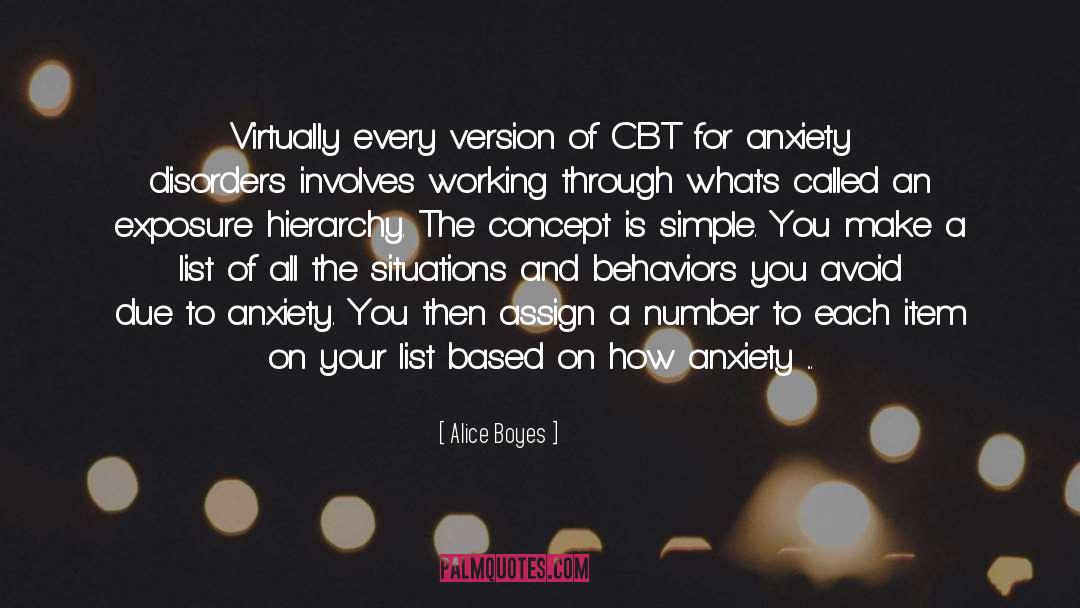
Stop Midflow, Rather Than When You're Completely Exhausted or Stuck
As mentioned earlier, anxious perfectionists often run their willpower tanks to absolute empty. One way this manifests is by ceasing work only at the point when you're completely exhausted or stuck. This can make getting restarted on a task very unappealing, because your most recent memory of the task will be of it not going well or feeling exhausted while doing it. We all have recency bias, meaning recent memories tend to be the most salient. You don't want your most recent memory of a task to be of feeling stuck or wiped out from it.
Experiment with what it's like to stop working while you're in the zone and still enjoying a task rather than when you're exhausted and frustrated. Notice whether doing this leads to you making better subsequent choices. For example, better eating choices at night after a hard day.
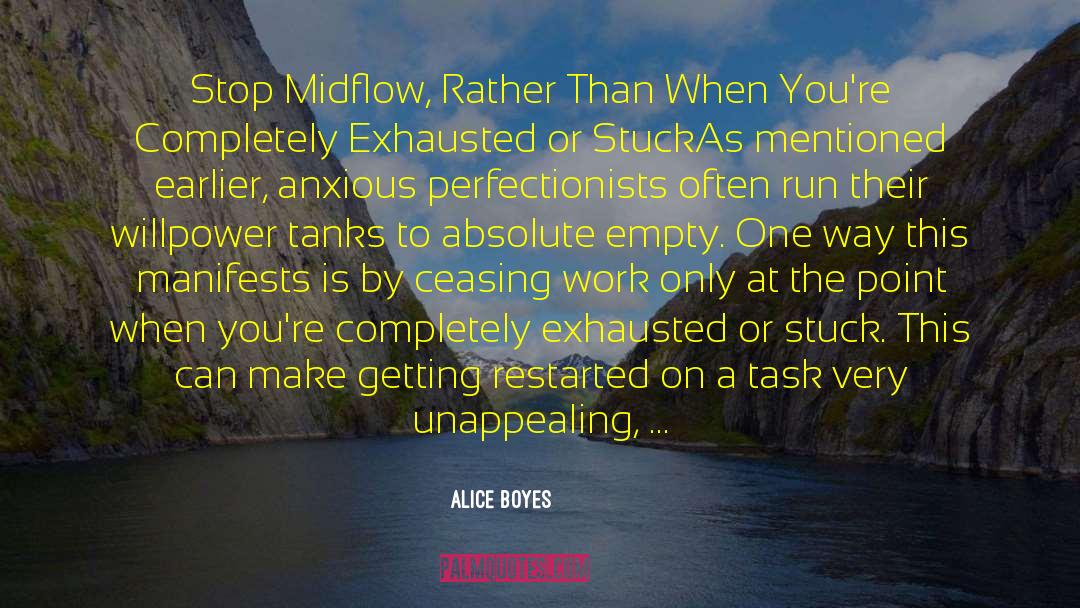
Deciding when and where you're going to do something will dramatically increase the likelihood you'll follow through. Let's look at the results from a specific study. Because most psychology research uses students as guinea pigs, this example relates to essay writing. Students who had an essay to complete were divided into two groups. One group was asked to state when and where they would complete their essay. Of this group, 71% completed the essay before the due date. The other group was given the due date but were not asked to state when and where they'd write their essay. Only 32% of this group finished on time. This extremely simple, two-minute intervention transformed the task from one in which most people failed to one in which most people succeeded.
To implement this change in your own life whenever you're planning to take action, identify when and where you'll act. Make this a habit you do every time.
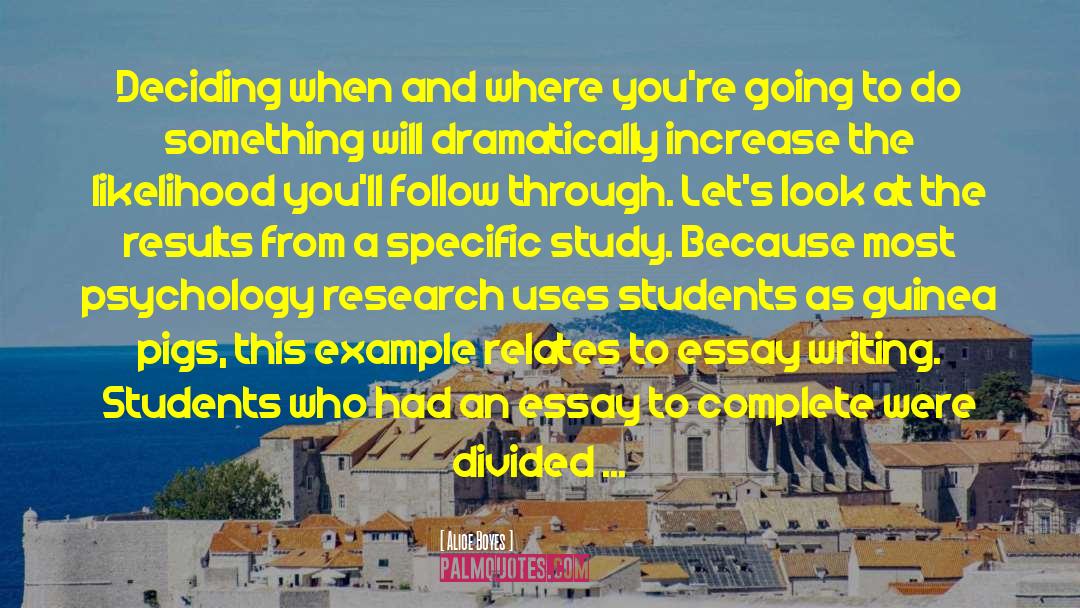
Conscientiousness
Not every anxious person is conscientious, but because you're reading a CBT-based self-help book, there's a good chance you're at least moderately high in conscientiousness - a personality trait associated with having a strong work ethic and a thorough, orderly approach to tasks. People high in conscientiousness often get particularly great results from learning cognitive behavioral principles and skills. Why? They tend to like the systematic nature of a cognitive behavioral approach. They do well because they work hard to understand themselves and are diligent in applying their learning to their lives. Anxious people sometimes underestimate how conscientious they are, so make sure you give yourself enough credit for your conscientiousness.
It's important to understand that conscientiousness is not the same thing as perfectionism. For example, perfectionists might spend so long trying to make something "just right" that they don't have any willpower left over for other important tasks. Perfectionism and conscientiousness tend to be associated with opposite outcomes. For example, in a study of older adults, perfectionism was associated with an increased risk or mortality. Conscientiousness was associated with a decreased risk. There are big advantages to reducing perfectionism but retaining your conscientiousness!
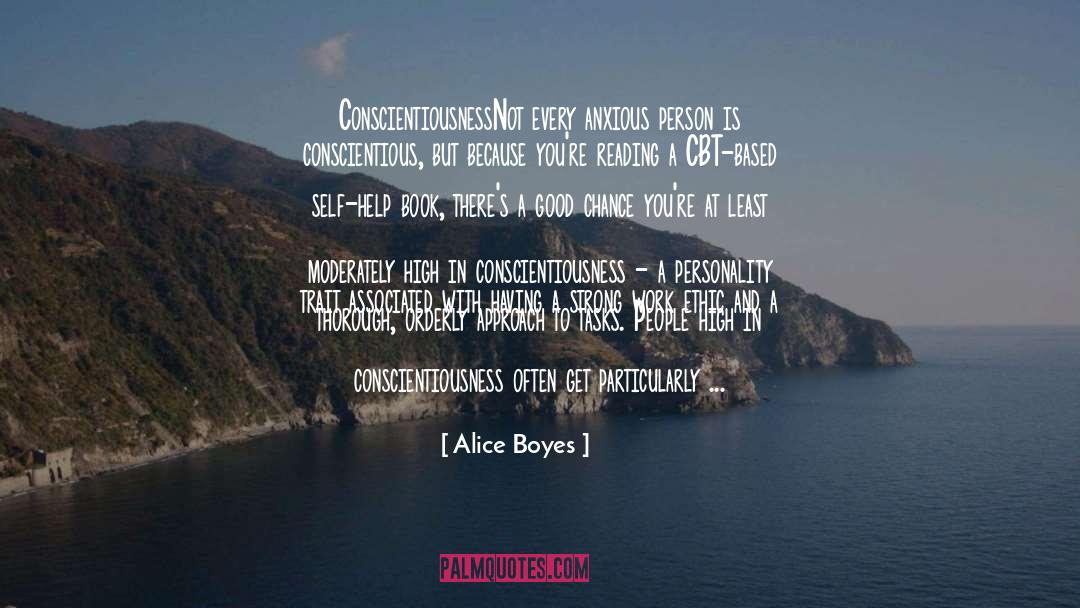
If you've been working on your thinking errors for only a few months so far, then you're probably still at the stage where you mostly notice the errors after the fact. Going forward, you'll find some situations in which you're able to spot a thinking error at or close to the time it occurs. For example, you might notice yourself feeling upset about something that has happened during the day and later that evening realize you've been mind reading: guessing what someone else thinks without knowing if it's actually the case.
Expect to have a mixture of these situations and those when you notice your thinking error only after you've been walking around buying into that sucker for months or even years. You might get some new information or evidence and only then realize you've been holding on to a distorted thought.
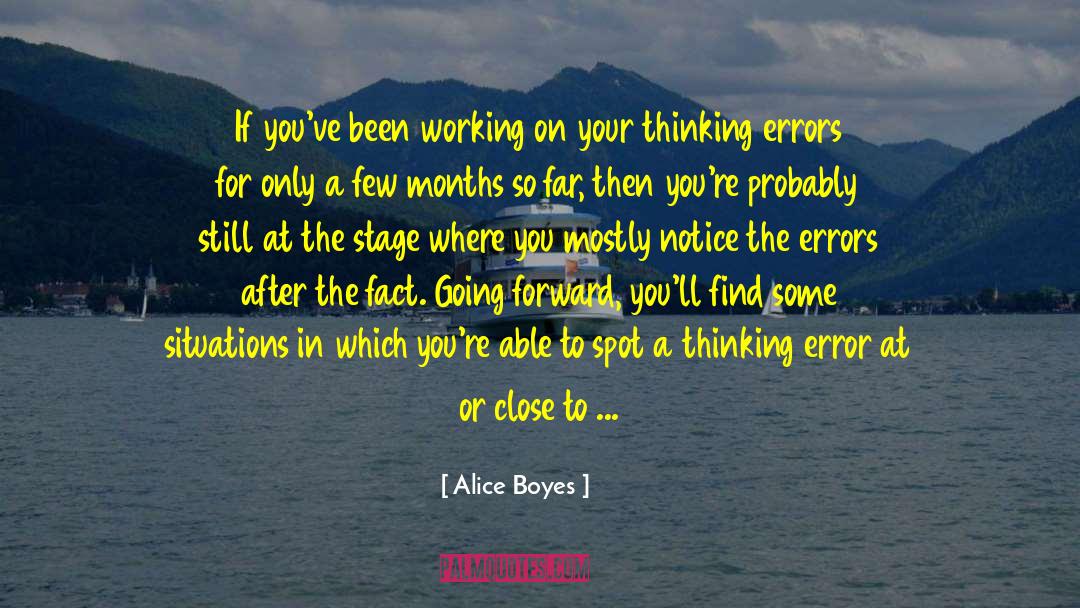
If there is any anxiety habit that seems particularly hard to break, it's self-criticism, but it's a habit that needs to be broken. When you use self-compassion rather than self-criticism to cope with stuff that doesn't go according to plan, you'll notice that you start making far better choices. Self-kindness creates mental space, where you can think more clearly about what problem needs to be solved, and will help give you confidence that you've got the goods to be able to solve your own problems.
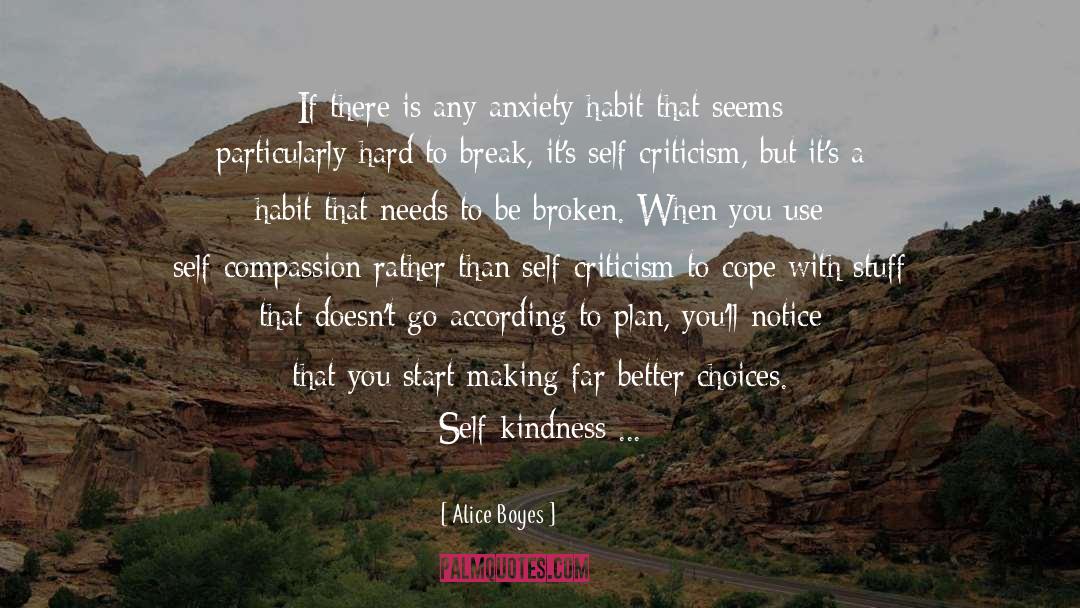
Behavioral Shifts to Overcome Excessive Hesitancy
Important: So far we've been focusing on how tweaking your thinking can help shift your behavior. This is important, but it's only half the story. People are usually quite good at identifying how changes in thoughts or feelings may lead to changes in behavior, such as "When I have more energy, I'll do more exercise" or "When I have more ideas, I'll take more action." However, people tend to underestimate the impact of changing their behavior on their thoughts and feelings, such as "When I exercise more, l'll have more energy" or "When I take more actions, I'll have more ideas." Don't make the mistake of thinking you need to wait for your thoughts to change before you try behavioral shifts. Mental and behavioral shifts go hand in hand. When you start making changes in your behavior (even subtle ones), you'll notice that all kinds of thoughts, including your view of yourself, start to shift. Changing your behavior, without waiting for you thoughts to always shift first, is one of the best and fastest ways you can reduce your anxiety. That's why a cognitive behavioral approach focuses on both thoughts and behaviors.
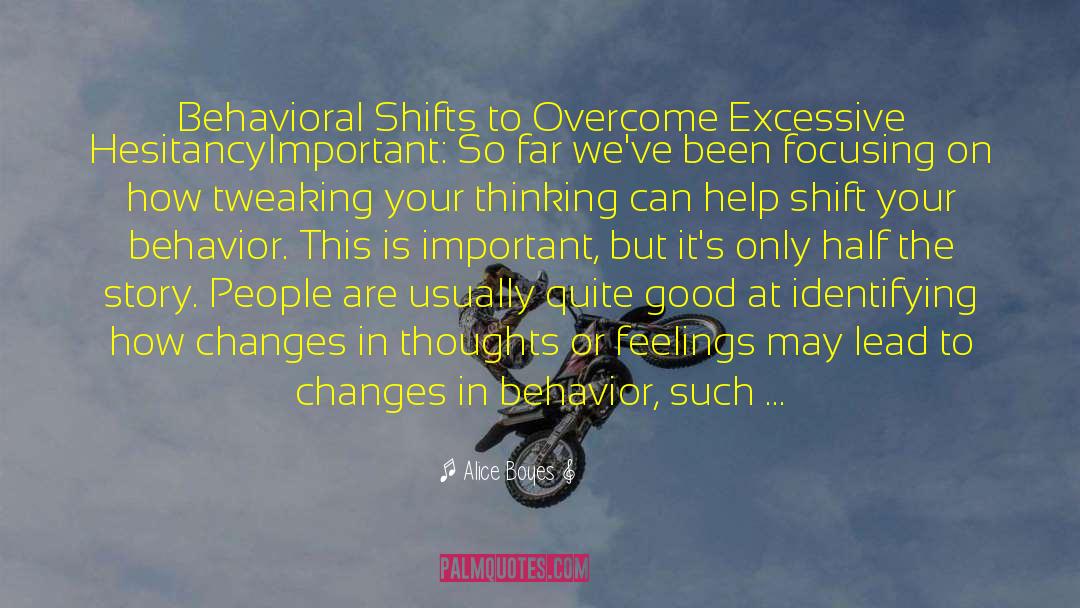
Catch Either/Or Thinking
Anxious perfectionists will typically think "I need to perform flawlessly at all times," with their underlying assumption being "or else it will result in disaster." This is a common type of thinking trap termed either/or thinking. In this case, the either/or is this: Either there is flawless performance or complete and utter failure, and nothing in between.
Not only can this style of thinking make you feel crushed when you don't meet your own ideal standards, but it also often leads to perfectionism paralysis. Take, for example, an artist who sees his future career prospects as becoming either the next Picasso or a penniless flop; this person doesn't see other possible outcomes in between. You can see how this would give the artist a creative block.
For other folks, their hidden assumption may be slightly different: "Either I need to perform flawlessly at all times, or other people will reject me." When I look back at my clinical psychology training, I realize I had this belief at that time. At a semiconscious level, I thought that the only way to prevent getting booted out of the program was to score at the top of the class for every test or assignment.
Ultra-high standards often arise because a person is trying to hide imagined catastrophic flaws. In this scenario, people often think that if their flaws get revealed they'll be shunned, and so the only way to conceal their defects is by always excelling. When people who hav

Act As If You Feel Relaxed About Feedback
People sometimes feel a spike of defensiveness when they receive negative feedback. You might feel annoyed at the feedback or feel upset. In these situations, try acting as if you feel relaxed. In other words, fake it till you make it. Acting as if you feel relaxed is one of the fastest ways to actually feel more calm. If you get an anxiety spike when you receive feedback or tend to feel defensive, try making your body language more open. Send nonverbal signals that you're open, even if inside you're not feeling it. Drop your shoulders, lift your head, make gentle eye contact, and relax your hands. When you do this, your thoughts and feelings will start to catch up with your nonverbal cues almost instantly. You won't feel completely relaxed, but it will help.
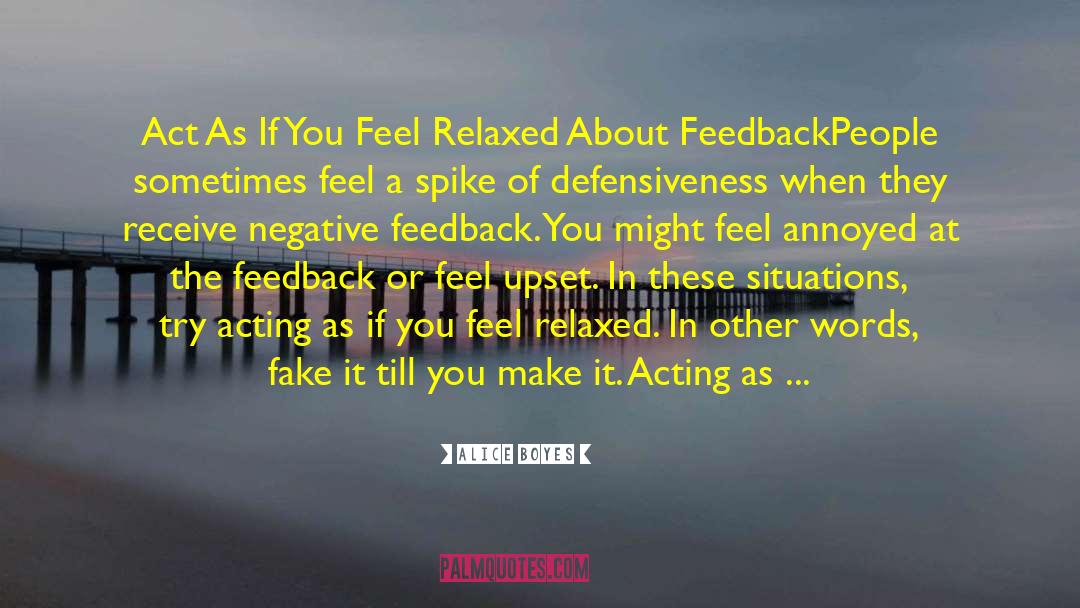
Processing Change
One of the ways people fundamentally differ from one another is that individuals vary in how much emotional energy it takes for them to process change or the idea of change. For example, some people may find it incredibly jarring when they have to deal with last-minute changes in plans or they have to work with different people from those they usually work with. People who need time and psychological space to adjust to change won't necessarily be anxious. However, they'll tend to develop anxiety if they aren't allowed, or don't allow themselves, the time they need to adjust to change, or if they don't have any emotional energy in their tank to cope with small changes in plans.
Are folks who require more energy to process change always rigid and unadaptable? No. They can still be very good at adapting - if they have the self-knowledge to navigate changes in a way that works for their nature. They will generally function best if they have habits, routines, and relationships in their life that give them a base level of consistency and familiarity. This could be as simple as eating the same thing for breakfast every day, having stable long-term relationships, or having particular routines for what they like to do on the weekend. Having some stable, familiar elements to life can help people tolerate changes in other areas.
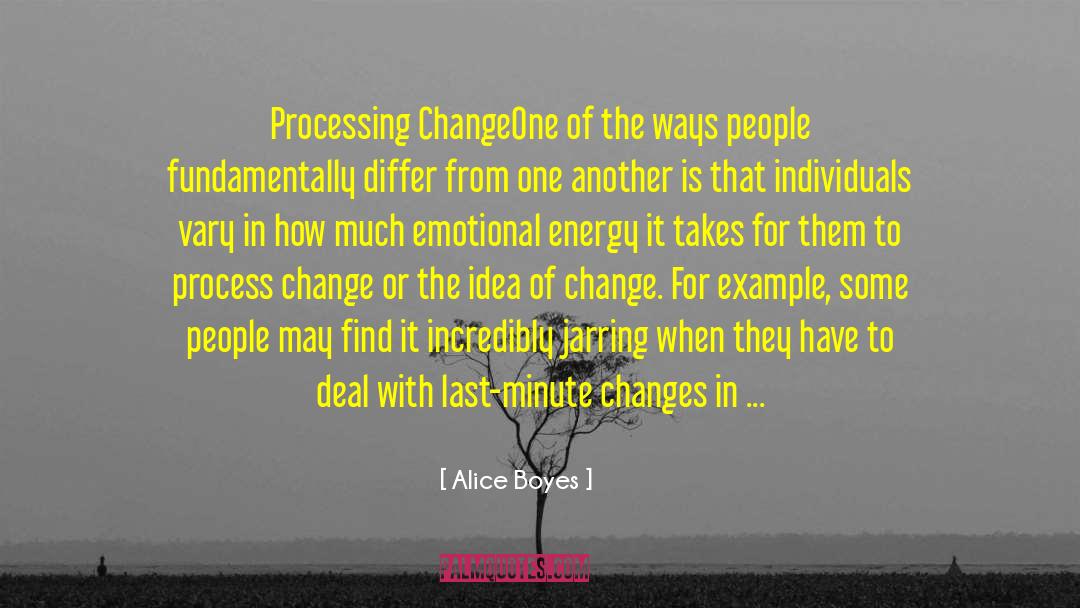
The tendency to predict that your actions will have negative outcomes is incredibly central to anxiety problems. If you can catch yourself when you're making a negative prediction and entertain alternatives, you'll likely ease a great deal of your anxiety. While there is a lot of information in this book, mastering this one simple principle will take you a very long way toward solving your anxiety issues. Pay close attention to this concept.
Whenever you're feeling anxious, use this feeling as your cue to practice articulating your negative prediction and an alternative. Try prompting yourself to think of the best possible outcome, instead of just the worst. You don't need to completely eliminate your fear; you just need to consider the different possibilities side by side, in an evenhanded way.
Experiment: For an action you'd like to take, try articulating both your feared negative outcome and an alternative possible outcome, just like the painting-the-walls example. If you practice this skill a lot, it will start to become a habit.
Feared outcome = __________________.
Alternative outcome = _______________.

Try a 30-Day Project for Overcoming Avoidance Coping
Avoidance coping habits aren't something you can snap your fingers and change. A 30-day project focused on gradually turning around avoidance coping can help. You can use this approach as an alternative to the exposure hierarchy if doing a 30-day project seems more appealing or relevant to you.
During the 30 days, take as many opportunities as you can to be less avoidant than you usually would be. This will help you overcome any problems you might have with not knowing where to start in reducing your avoidance. As situations come up, focus on taking some action, even if you're not certain what the absolute right action is. For example, if you're confused by all the options for backing up your digital photos in the cloud, you might ask your most tech-savvy friend what she does, and just go with that. You can always switch later.
Don't be too all-or-nothing about overcoming avoidance coping. We all have only so much willpower available for dealing with things we'd prefer not to do. The goal is to start unraveling your avoidance coping habits bit by bit. If you sometimes fall back into the avoidance coping trap, that's to be expected.
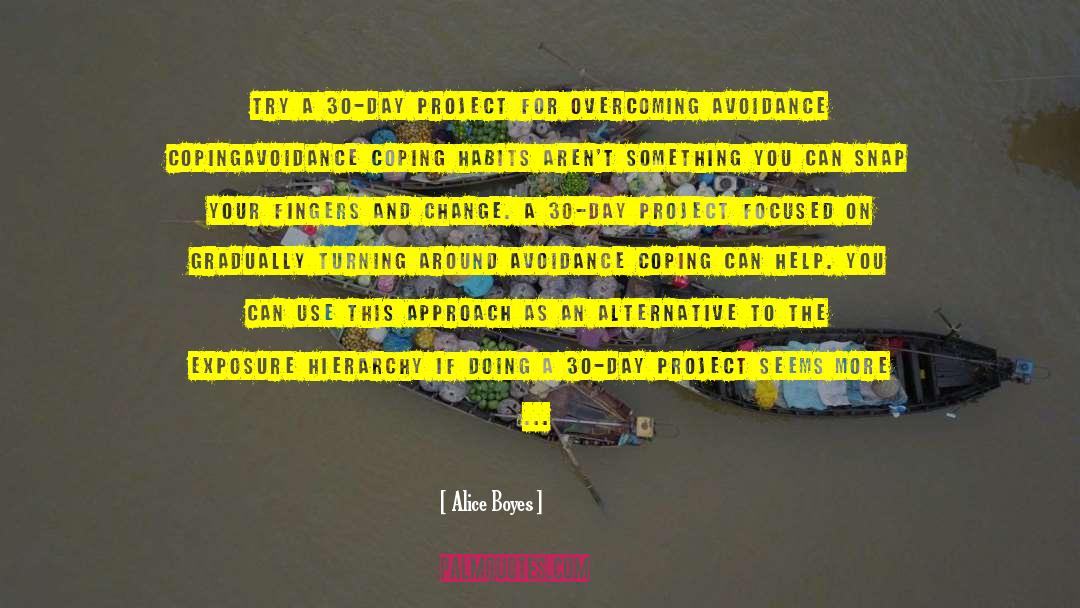
The take-home message: Even if you achieve only intermittent reinforcement - that is, you experience success only sometimes - having some successes will make your behavior much more resilient, and you'll be less likely to give up. Therefore, whenever you start something, focus on getting your first few successes.

People feel anxious when they step outside their comfort zone. Avoiding stepping outside your comfort zone would lead to living life less fully.

Important: When you're attempting to shift your thoughts, picking a new thought that you want to strengthen is essential. Think of changing a thought as like attempting to change a habit: When you change a habit, you don't so much break a bad habit as build up and strengthen a new one. When you practice entertaining new thoughts, eventually those new thoughts will start to become more automatic. In situations that used to trigger your old thoughts, now the new thought will also be triggered.
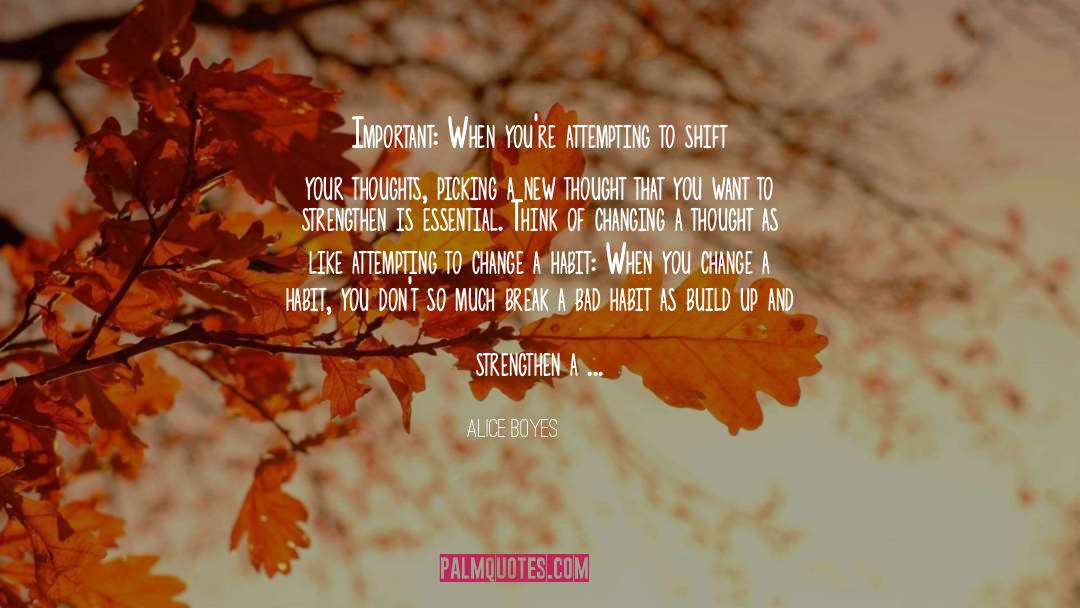
The more closely individuals monitor their symptoms, the more stressed out by them they become. When people make reducing anxiety their primary focus, they usually do a lot of checking in with themselves about how anxious they feel at any given moment and what anxiety-provoking situations they have coming up. They might wake up in the morning and immediately ask, "How anxious do I feel today?" Overall, this tends to make their anxious feelings worse.
Have you ever had a situation in which focusing on your anxiety symptoms has caused them to increase?
People sometimes think they need to reduce their anxiety before they start thinking about other goals. However, because overfocusing on anxiety isn't helpful, that's the wrong way around. You need to have your goals clearly in mind first, and then think about how you can pursue them without getting derailed by anxiety.
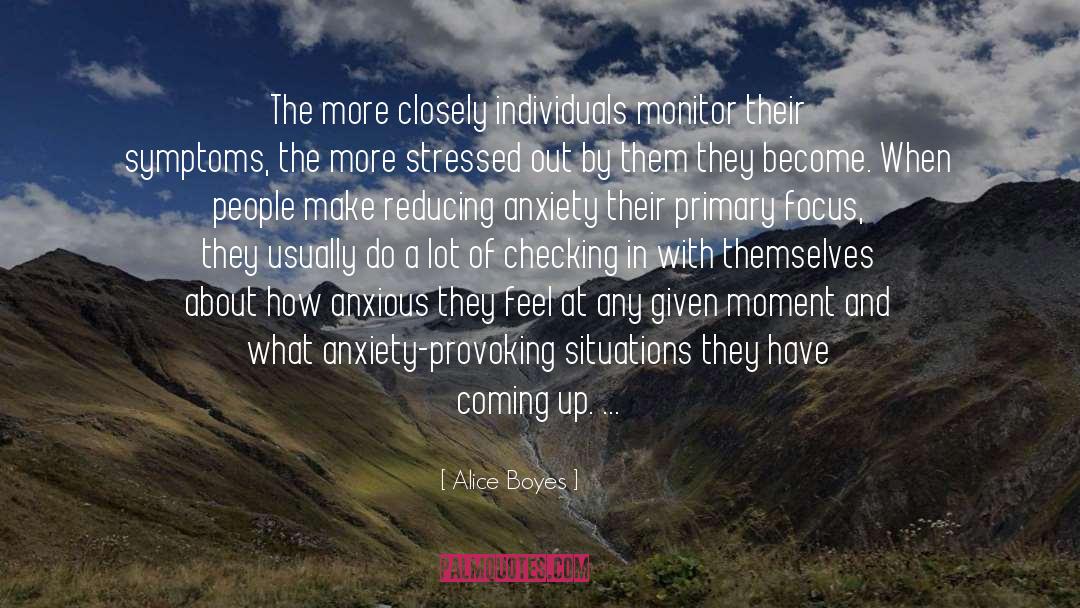
The Highly Sensitive Person
Sometimes qualities that get lumped together as part of introversion or anxiety are more closely related to a concept known in psychology as high sensitivity. Some of the typical characteristics of a highly sensitive person (HSP) include tendencies to:
--Process things deeply
--Get easily overwhelmed by too many things to do
--Get their feelings hurt easily
--Be sensitive to other people's moods
--Find negative news very upsetting, even if it's about people they don't know well
--Find it difficult to hide their true feelings, such as when they lack interest in a topic
--Find it difficult to filter out particular types of stimulation, such as being easily irritated by background noise or scratchy textured clothing
People who have a lot of these tendencies aren't necessarily anxious. However, they will often become anxious if they're forced into environments that overwhelm their capacity to filter excess stimulation.

Practice Tolerating Uncertainty
Look for opportunities to try taking action when you're not 100% certain of success. Gradually experiment with this over the coming months as opportunities come up. The more you learn from experience that you're capable of doing this, the easier it will become. Taking action swiftly will start to feel more natural. When an opportunity to act with uncertainty comes up, articulate the potential upsides of taking action:
--It could work out well.
--If it doesn't work out well, I'll move my thinking forward by seeing that the idea didn't work.
--I won't have to think about the decision anymore.
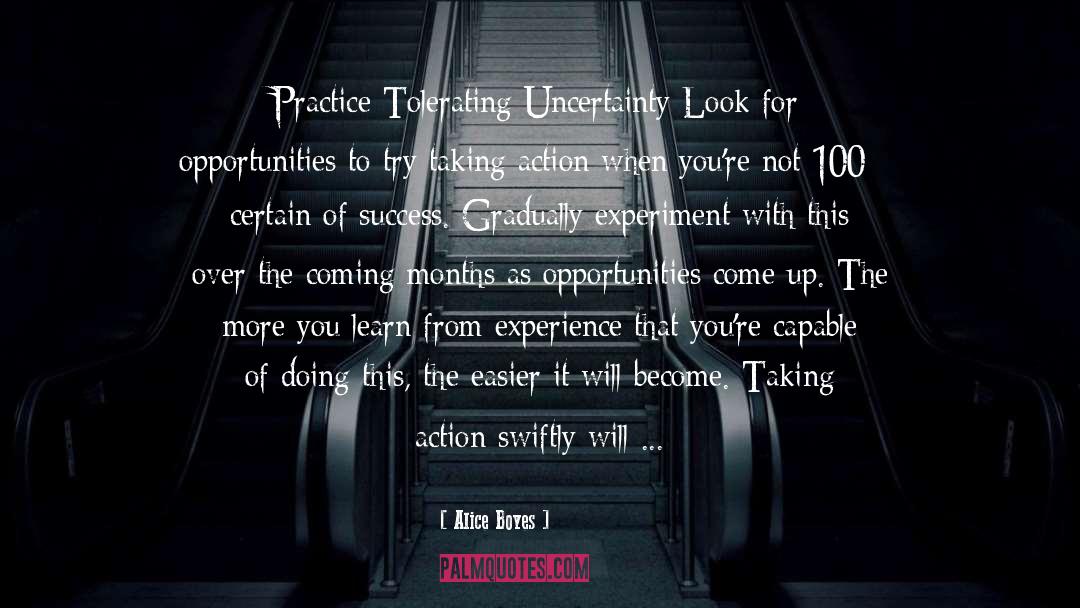
Counterproductive Types of Care and Caution
The same careful and cautious tendencies that can be helpful in some situations can become paralyzing in others. You might hold back from opportunities or get caught up in minutia while leaving bigger issues unattended. Very cautious tendencies can also cause people to hold back from attempting to form relationships - whether they be friendships or romantic, business, or collegial relationships. There's always some level of vulnerability that comes along with developing any type of close relationship. Therefore, in some cases, anxiety-based instincts to be self-protective can leave people feeling isolated and alone. Anxious people will sometimes avoid feeling vulnerable at all costs, even if it means feeling lonely or their isolation from peers thwarts their career success.
